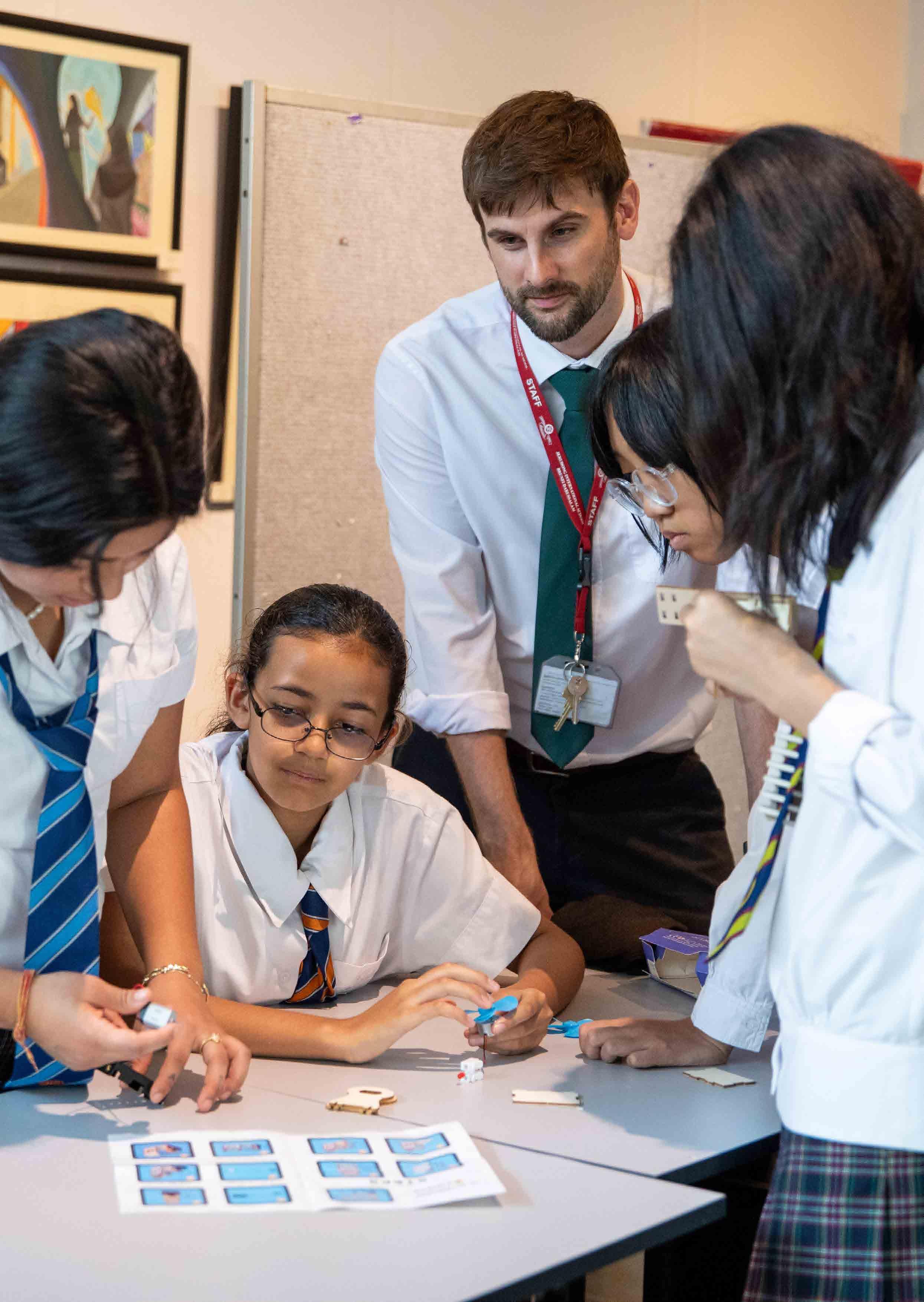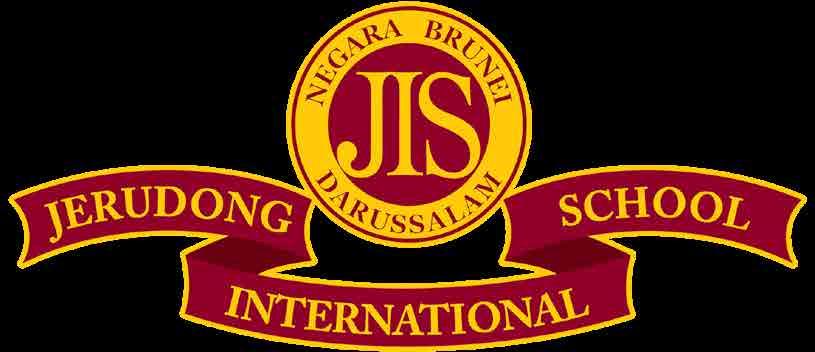



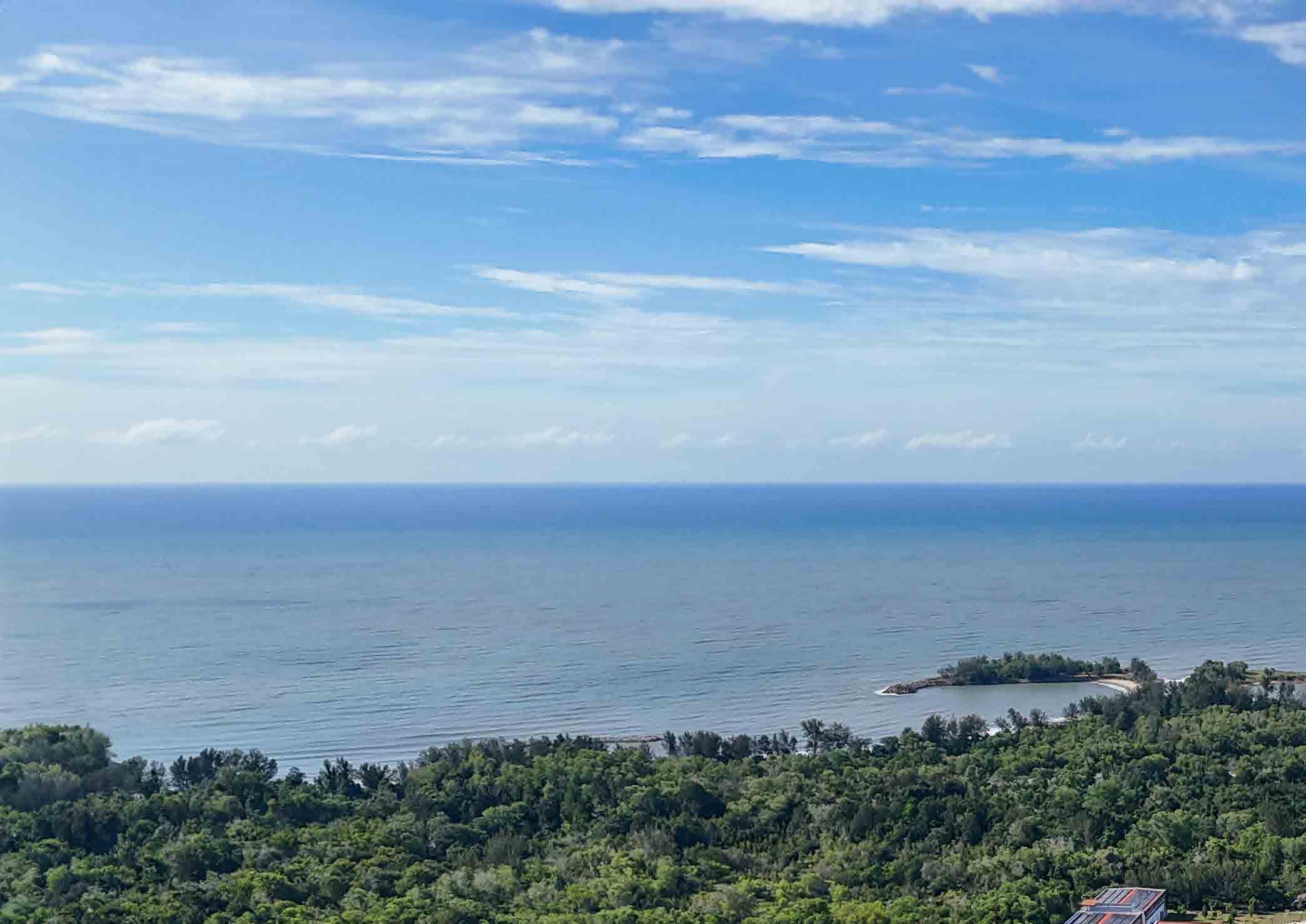






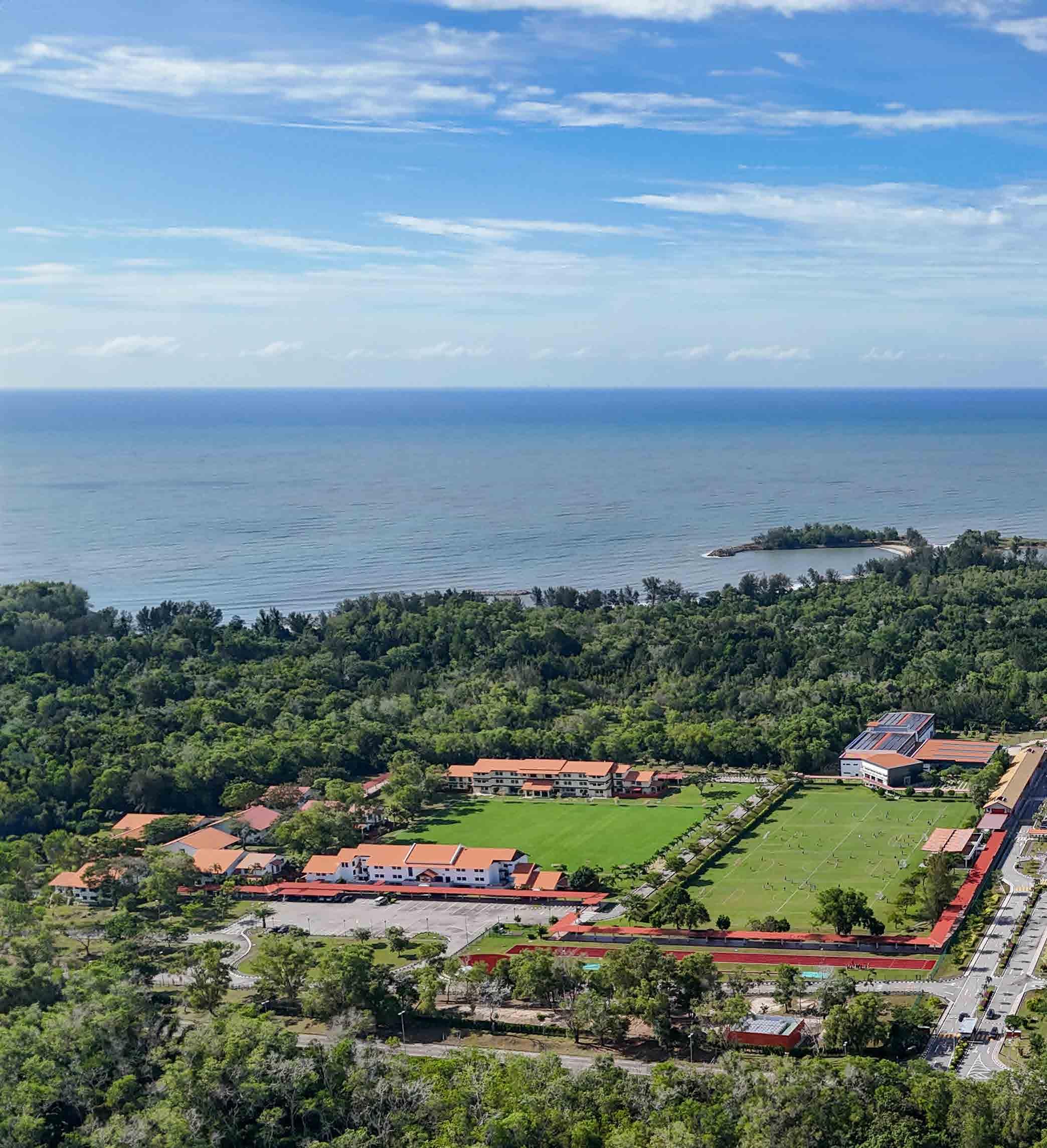

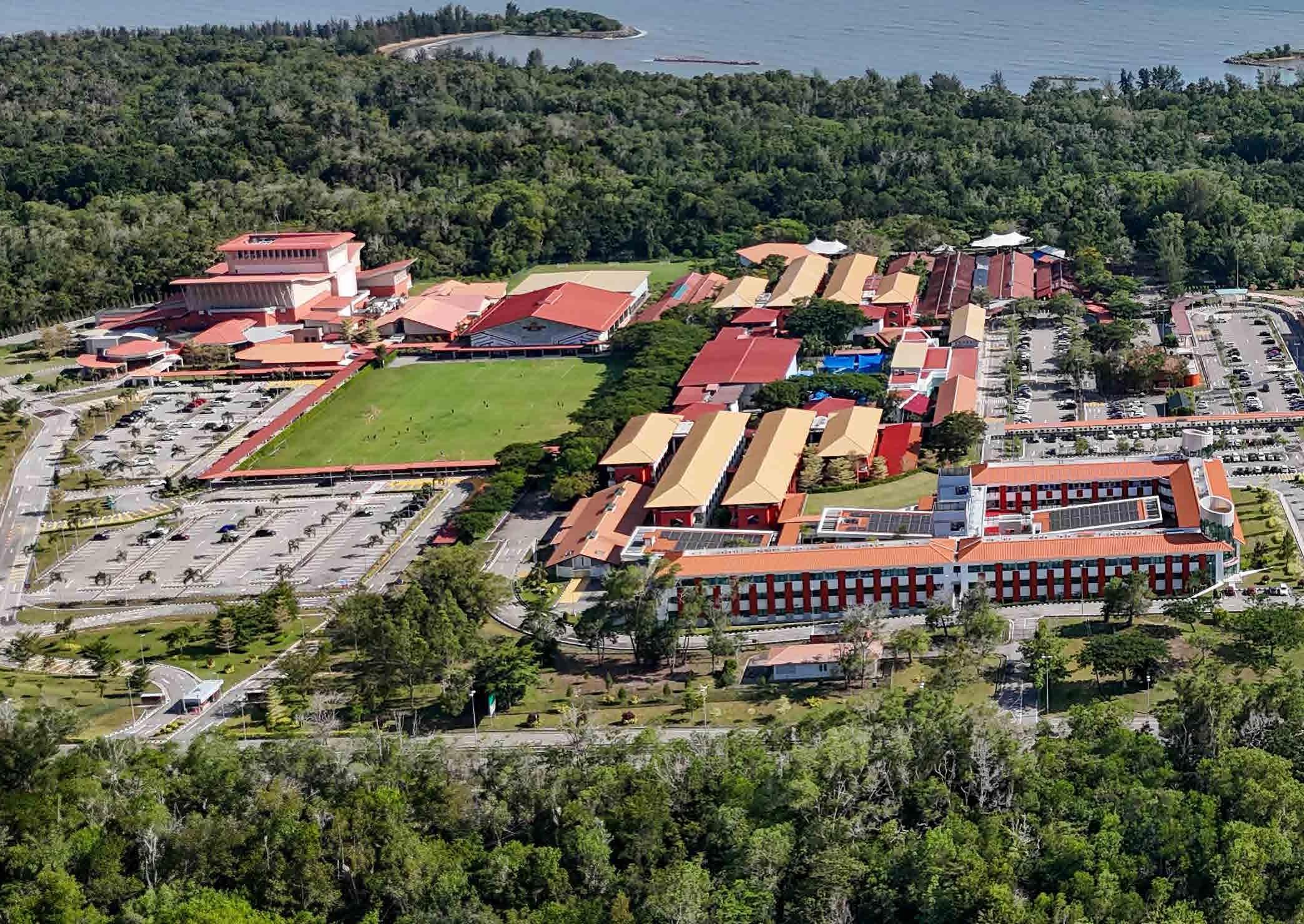
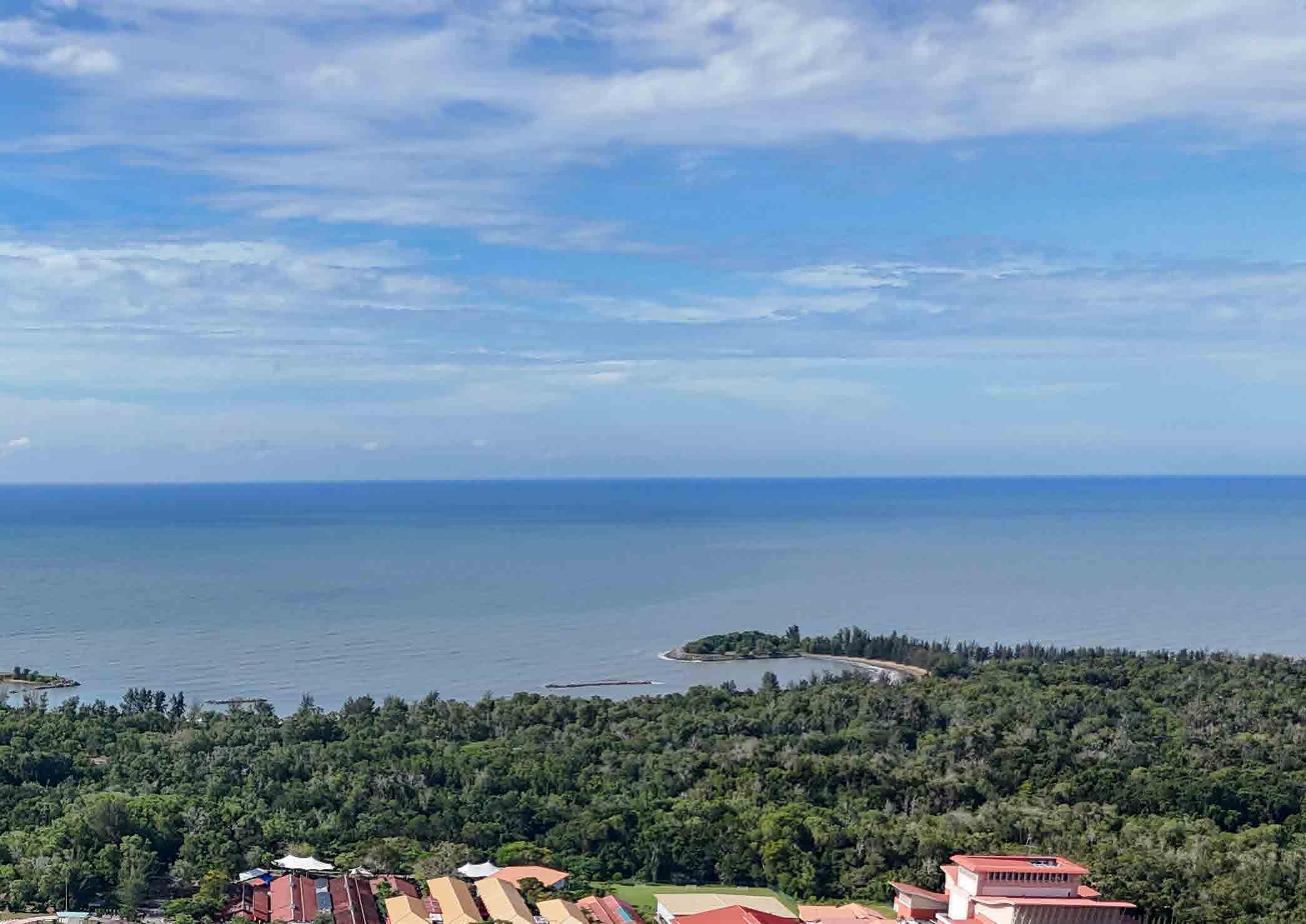
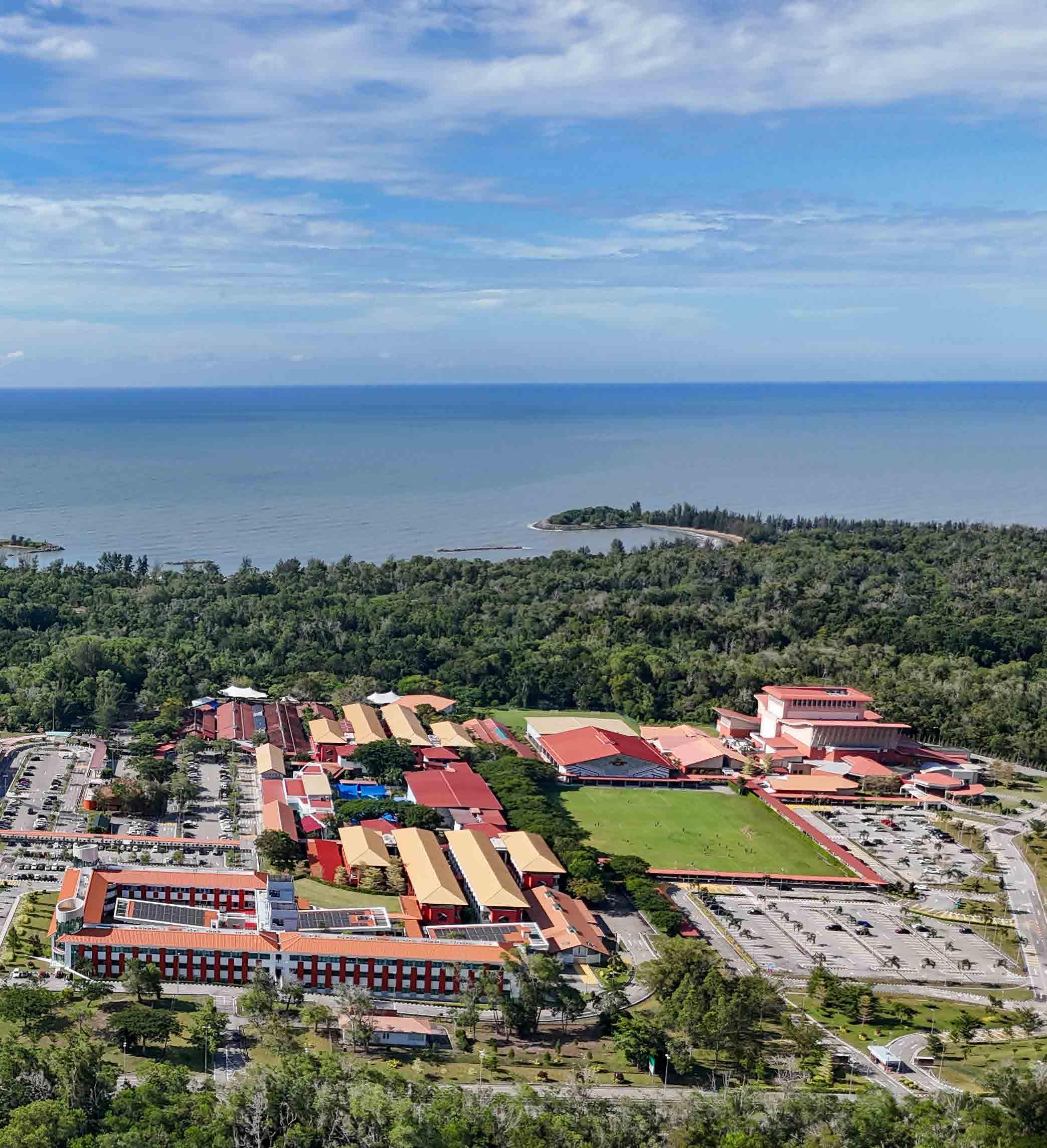

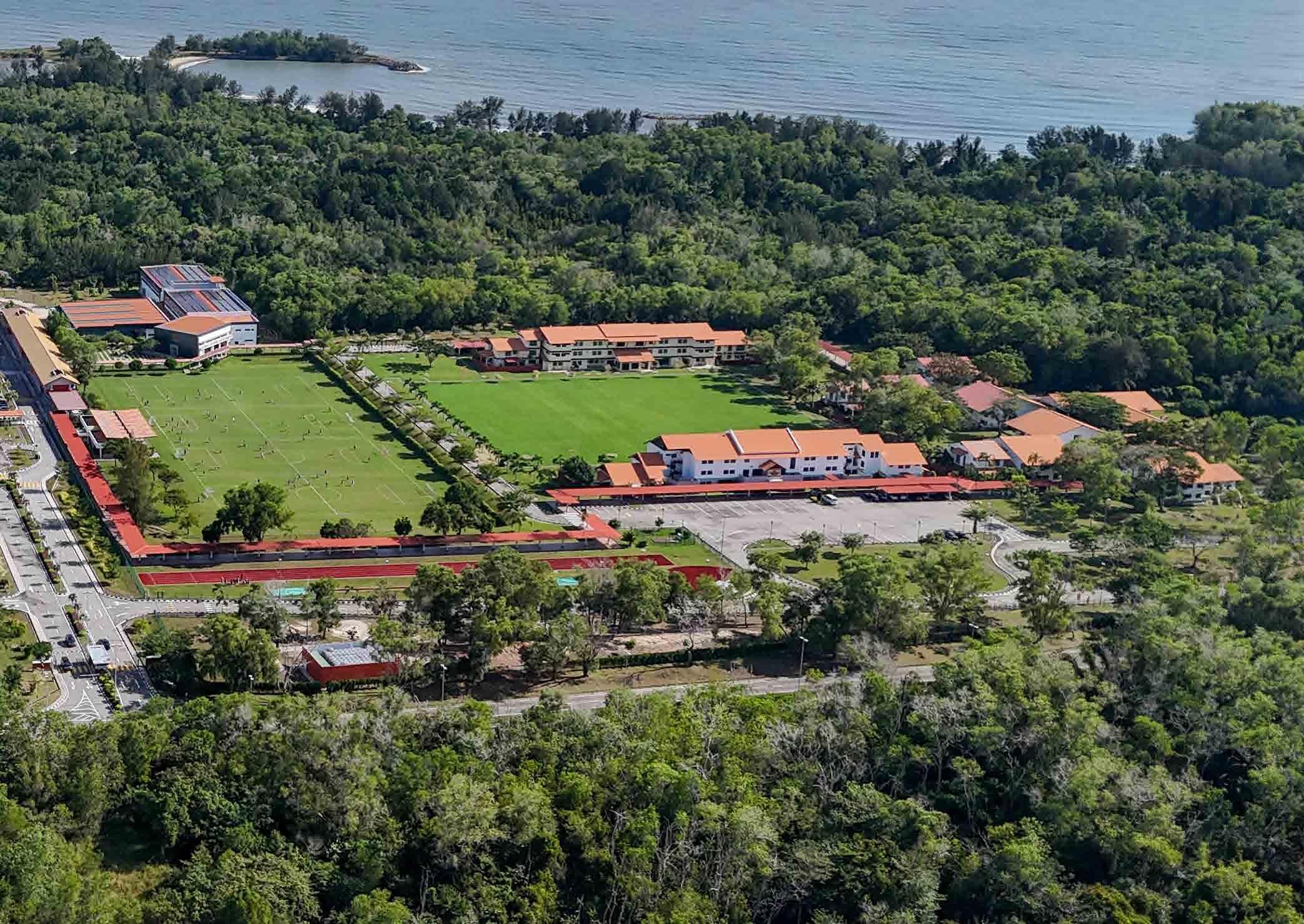
: Design & Technology
: Accounts, Admissions, Computing, English, Humanities, Laboratories, Business, Principal & Exams Office
: Science Shop : Stationery & Uniform Shop
A : Middle Years Office Learning Support
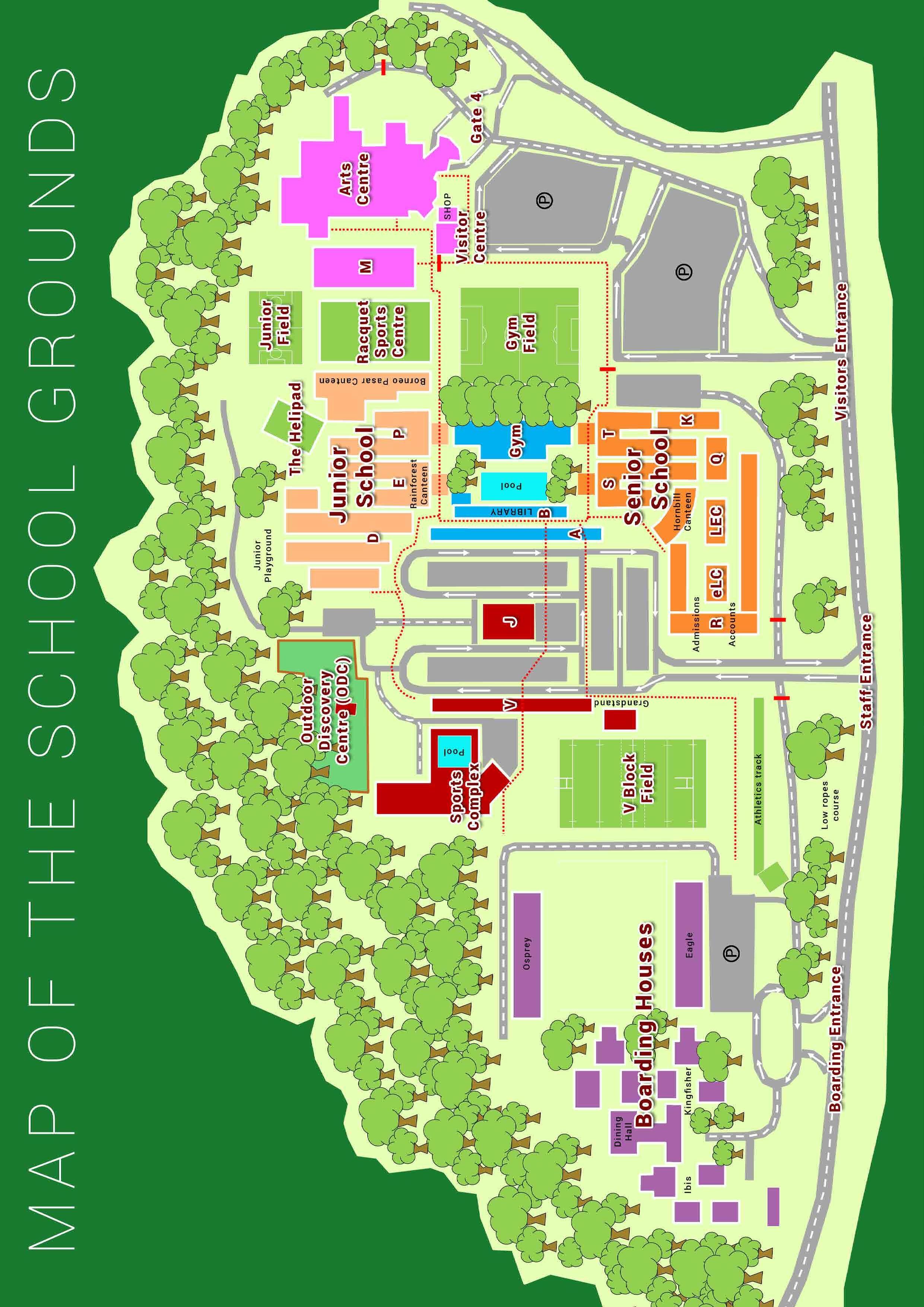
Centre : Drama
: Counsellors : Health Centre
: NurseryYear 2
: Years 3-5 & JS Office
: Maintenance
Design & Technology and Arts & Design
Lecture Theatre
: Parents’ Coffee Shop

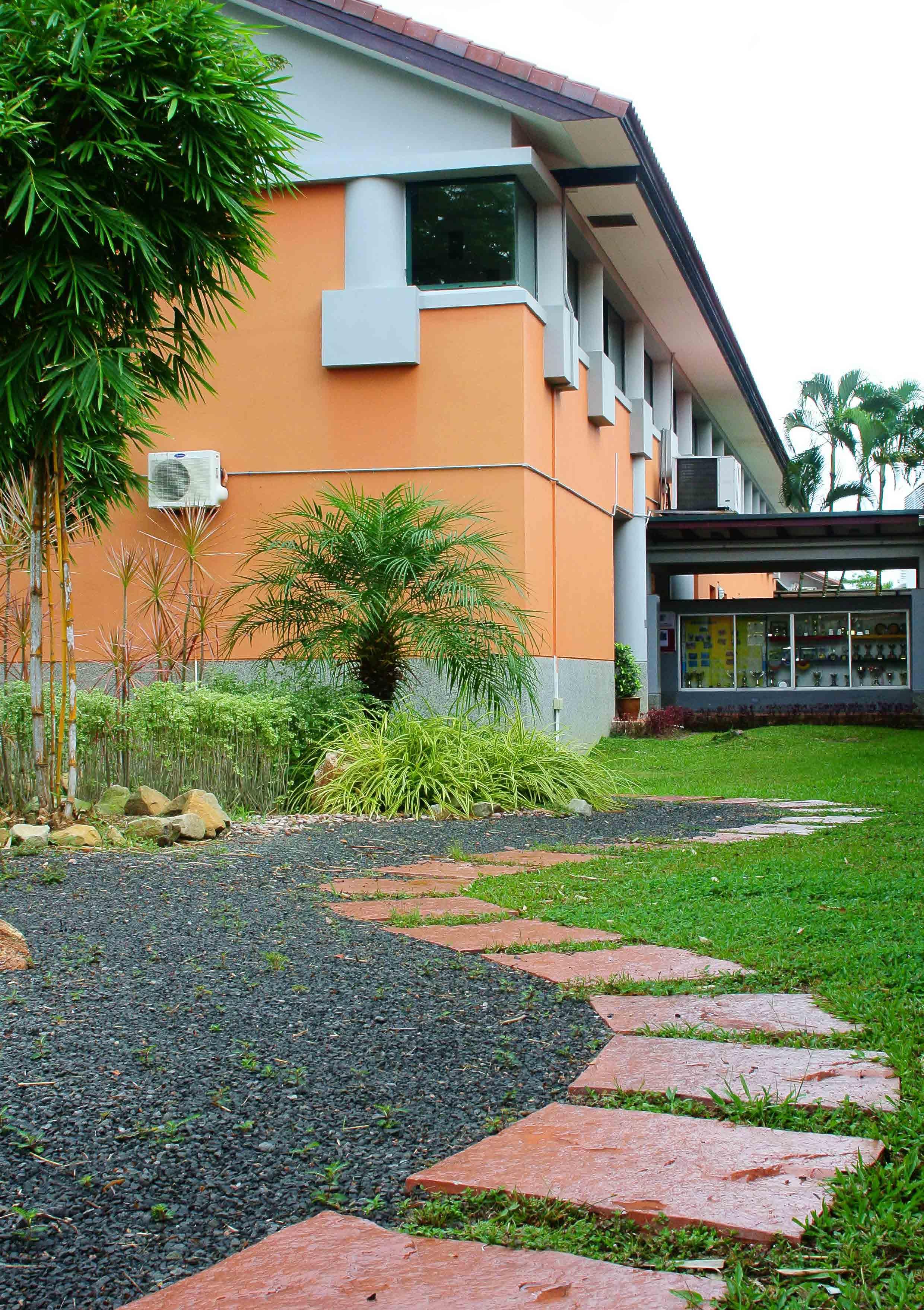


Mailing Address:
P.O. Box 1408
Bandar Seri Begawan BS8672, Brunei
Executive Principal
Nicholas Sheehan

Street Address:
Jalan Universiti Kampong Tungku Bandar Seri Begawan BE2119, Brunei





Argus
Executive Principal’s Secretary
Pui Yin Woo principal.secretary@jis.edu.bn ext. 7117
Vice Principal & Head of Senior School
Daniel Milner
Academic Director
Alex Cook
Pastoral Director
Lynsay Scott
Assistant Head of Senior School (Years 12-13)
John van der Marel
Assistant Head of Senior School (Years 10-11)
Ralph Morel
Upper Years Secretary
Amy Lai amy.lai@jis.edu.bn ext. 7116
Assistant Head of Senior School (Years 7-9)
Jennifer Cole
Middle Years Secretaries
Izzah Abdul Kadir
Aiman Ali myo@jis.edu.bn ext. 1100 ext. 1106
Accounts
Karen Yong
Wee Hui Tan accounts@jis.edu.bn ext. 1314
Stationery and Uniform Shop
Liza Sheriff jis.shop@jis.edu.bn ext. 5240/5244
Admissions
Rebecca Dillon
Kerima-Jo Rahman
Jennifer Ng
Farah Sabli
Sil Suan Tan admissions@jis.edu.bn ext. 1205 ext. 1206 ext. 1206 ext. 7100 ext. 1129
School Counsellors
Gavin Rodgers (Lead)
Anth McKay
Nadzirah Suhaimi counsellor@jis.edu.bn ext. 1211 ext. 2313 ext. 2313
Angela McCambridge hsms.argus@jis.edu.bn
Barbet
Antony McCambridge hsms.barbet@jis.edu.bn
Blackeye
Rachel Brown hsms.blackeye@jis.edu.bn Fireback
Olivia Prince hsms.fireback@jis.edu.bn
Frogmouth
Sue Mead hsms.frogmouth@jis.edu.bn Hawk
Matthew Smith hsms.hawk@jis.edu.bn
Heron
Naomi Williams hsms.heron@jis.edu.bn
Monarch
Peter Foster hsms.monarch@jis.edu.bn
Sandpiper
Ingrid Lush hsms.sandpiper@jis.edu.bn
Skylark
Yvette Conway hsms.skylark@jis.edu.bn
Swift
Dave Smith hsms.swift@jis.edu.bn
Whistler
Juliette Horsford hsms.whistler@jis.edu.bn
Boarding Houses - Boys Eagle
Dan Stirling hsms.eagle@jis.edu.bn
Ibis
Ed Lockyer hsms.ibis@jis.edu.bn
Boarding Houses - Girls Kingfisher
Beenal Roberts hsms.kingfisher@jis.edu.bn Osprey
Jennifer May hsms.osprey@jis.edu.bn admissions@jis.edu.bn or office@jis.edu.bn +673-241-1000 www.jerudonginternationalschool.com

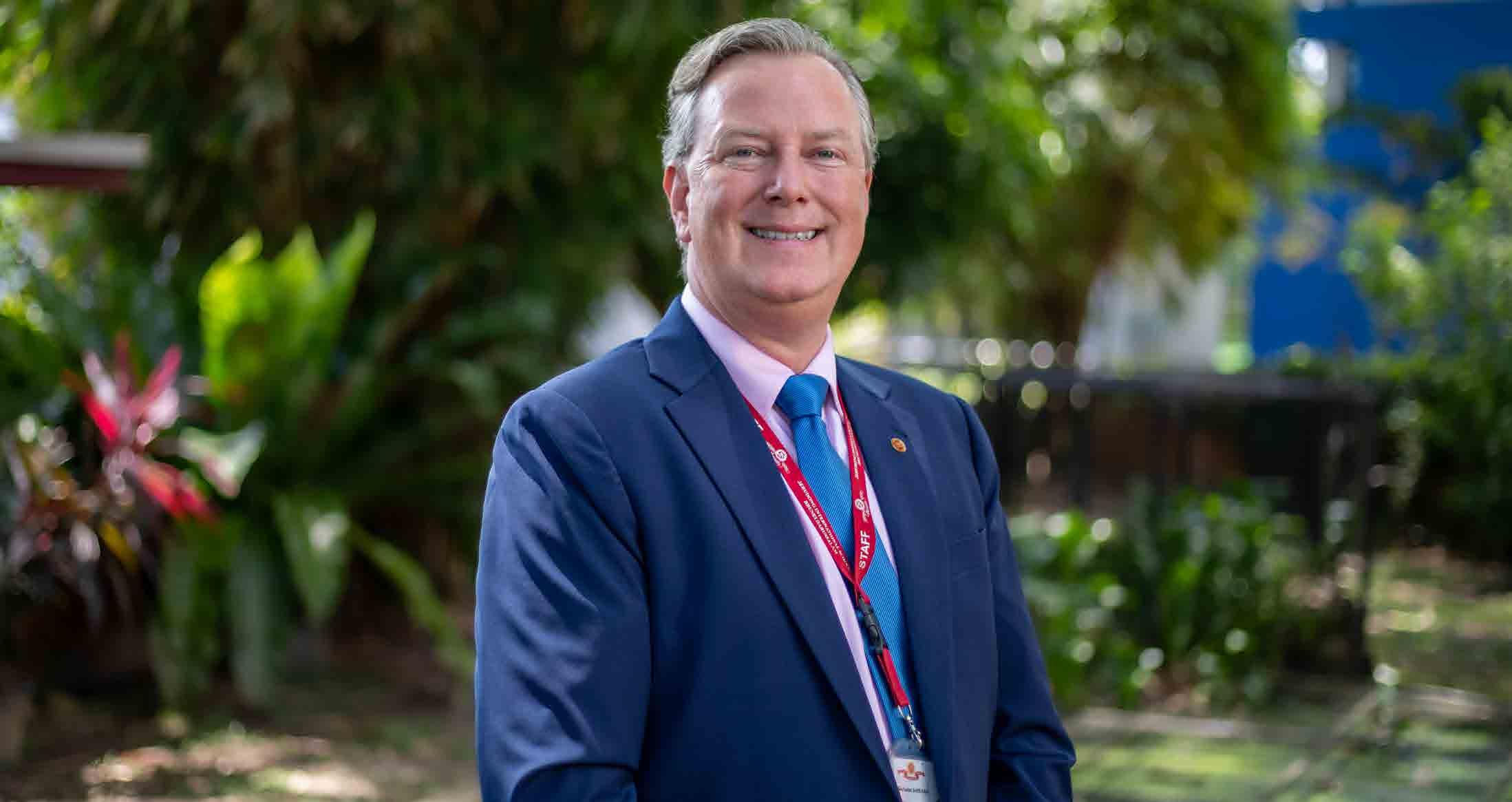
A warm welcome to Jerudong International School (JIS) in Brunei.
As a community, we are committed to creating an environment of excellence and holistic development, where every individual is encouraged to reach their full potential, both academically and personally. We are an academically selective school offering the British International School curriculum, and are very proud to be a Beacon Status School following our COBIS Patron’s Accreditation. This means that parents can be safe in the knowledge that when they choose to enrol their child in JIS, they will be receiving an outstanding, transformative education.
We work hard to create a challenging and nurturing environment that enables each child to flourish. Students consistently excel in their examinations and go on to top universities around the world, including Oxbridge and the Russell Group of universities. We believe in the traditional values of an independent school education but we also embrace exciting innovative, new practices.
At JIS, we are proud to uphold a strong ethos based on our values of Challenge, Respect and Inspire encouraging responsibility and a passion for learning. We believe in the power of collaboration and
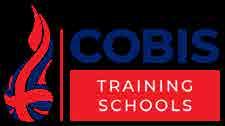





inclusivity and our curriculum is designed not only to challenge students to think critically but also to inspire them to become confident, creative and compassionate leaders of tomorrow.
We are dedicated to developing well-rounded individuals who are not only academically proficient but also socially responsible, culturally aware and globally minded. Whether through our academic programmes, extracurricular activities, or pastoral care, we aim to provide an enriching educational experience that prepares students for success in an ever-changing world.
We also appreciate the important role that parents play in guiding the educational progress of their children and work closely in partnership with our parents, to support us in reinforcing our values.
We warmly welcome you to visit us and see why Jerudong International School is a truly exceptional place to learn and grow.
Welcome to Jerudong International School!
Nicholas Sheehan EXECUTIVE PRINCIPAL

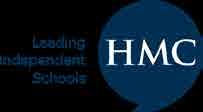


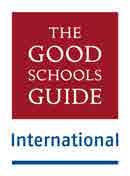
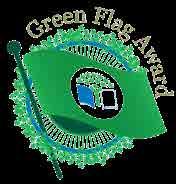

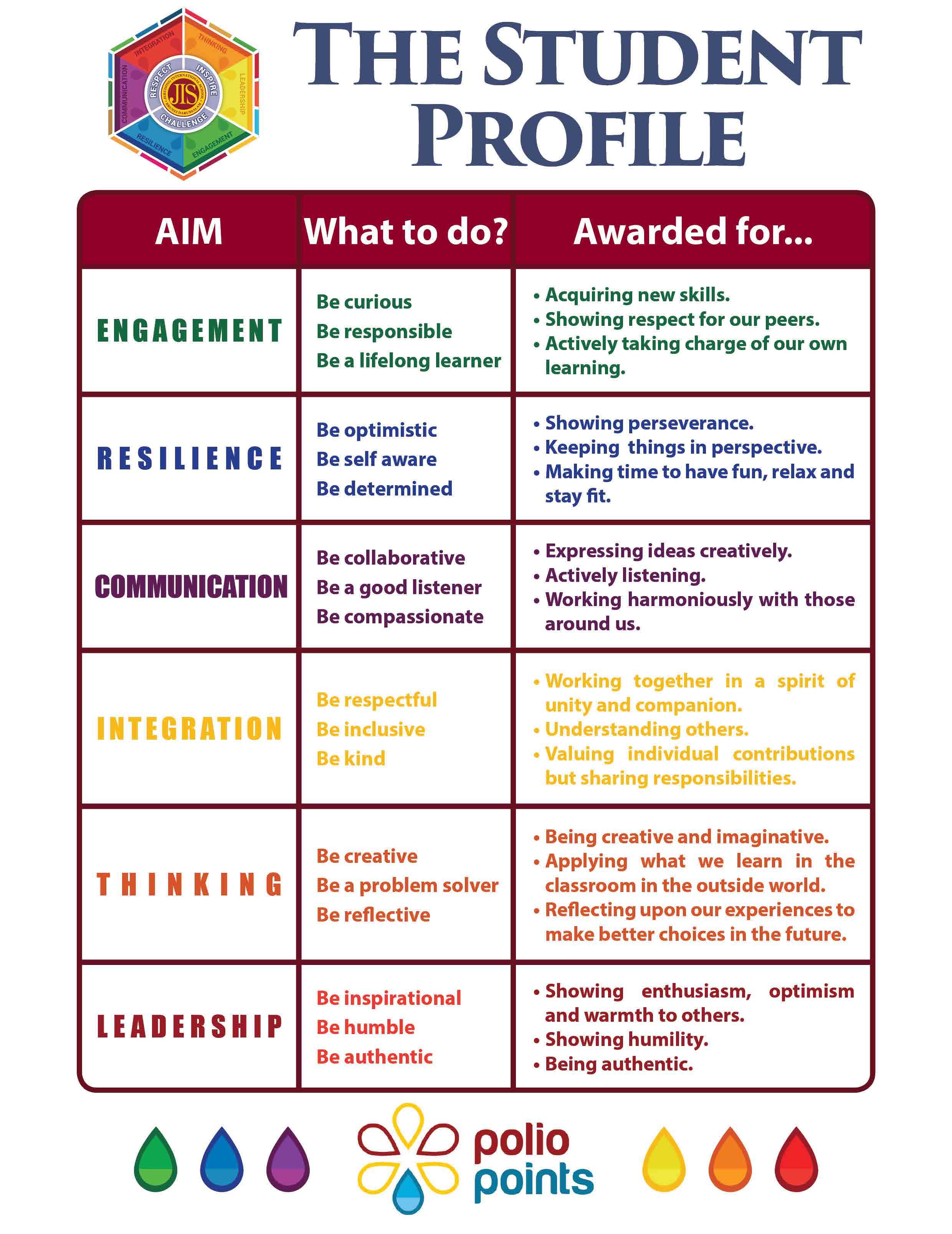

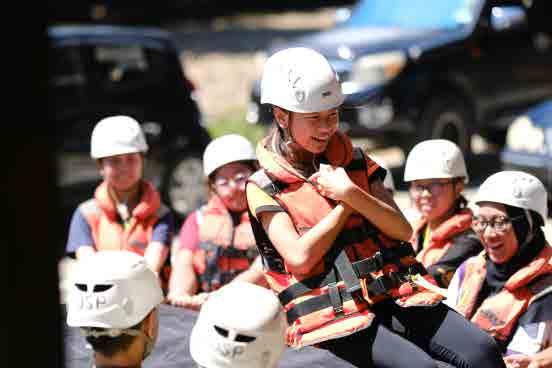
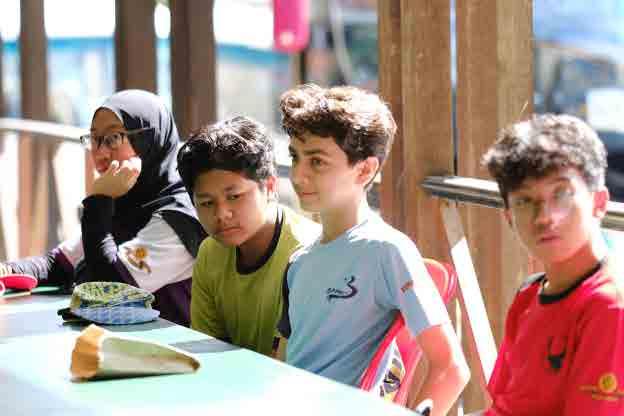
PEACE WEEK
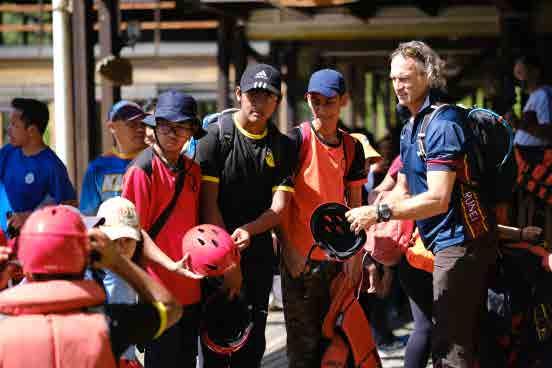
EARTH WEEK
INTERNATIONAL WEEK
FOOTBALL FUNDAY
WAR OF COLOURS
MUSICAL PRODUCTIONS
SHOWCASE CONCERT
HOUSE CONCERT
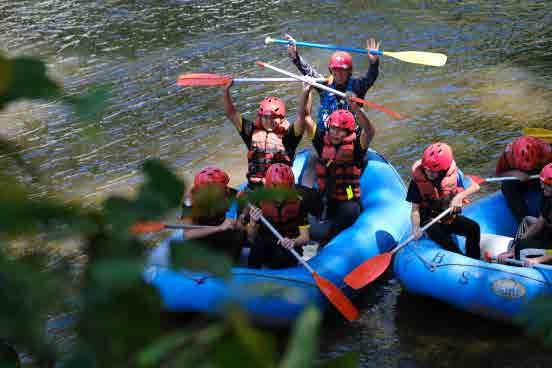
LUNCHTIME LECTURES
FOBISIA GAMES
HOUSE SPORT
DUKE OF EDINBURGH
MODEL UNITED NATIONS
ECO JIS
BORNEO PROJECT
PENAN SUPPORT
DIVING CLUB
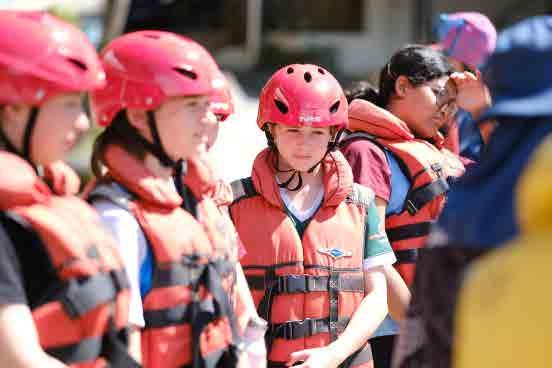
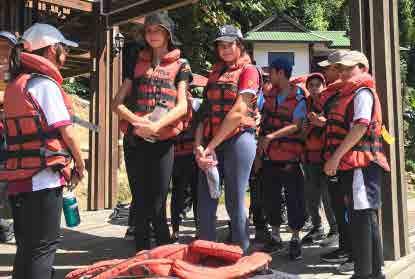
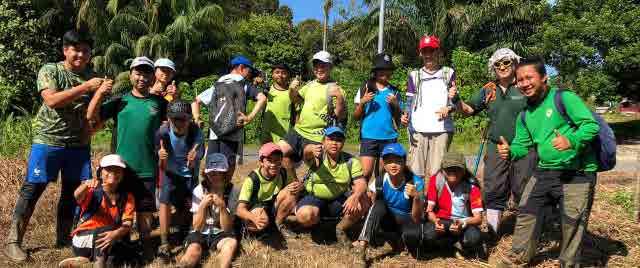
Year 7 at JIS is an exciting start to the Middle Years journey. Students from diverse backgrounds join together, kicking off the year with team-building activities to feel connected and welcomed into the school community.
Each student belongs to a House and follows a weekly schedule of 13 subjects. Popular classes include English, Computing, and Geography. Beyond lessons, there are many extracurricular activities, like Model United Nations and Scouts. Lunchtime offers options such as Student Council meetings, maths enrichment, reading in the library, or simply relaxing with friends. The Student Council organises events like International Week, Peace Week, and RUOK Day, promoting inclusion and well-being.

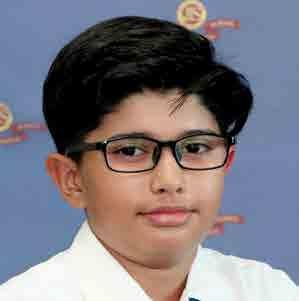
A highlight of Year 7 is the overnight trip to Temburong. Students enjoy activities like jungle walks, blow dart competitions, river swimming, and cooking traditional local dishes. Sleeping in rainforest dorms and spending time with friends makes it a memorable adventure, strengthening friendships and creating lasting bonds.
Year 7 is a time for learning, personal growth, and making new friends. Supportive teachers and a welcoming environment help students take on challenges and thrive. Being part of the Meerkat Family is a special experience, with mascots Maya and Cappo adding to the fun.
My time in Year 8 so far has been amazing! The JIS community is so inclusive and friendly. I came to JIS in Year 3, and at that time, I was super nervous. I had migrated and moved schools from Australia, so it was a tough transition for me at a young age. But all my encouraging friends and teachers I met made me feel like I was part of a huge JIS family.
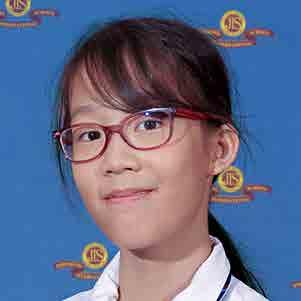
I would say Year 8 is a lot more challenging than Year 7, but on the flip side there are even more opportunities and school trips. My usual school week consists of thirteen different subjects. My preferred subjects would be P.E, Science and D.T. I also managed to fit in a few CCA’s this term, such as Badminton and Textiles Sustainability. I really enjoy doing these CCA’s as it helps me express myself in different ways, and also spend time with my friends. International day is definitely my favourite time of the year, not only because there are lots of yummy vendors coming to our school, but also because I love to see how our Meerkat family has so many different backgrounds and cultures, and how we all belong together in this school despite many differences.
I love being at JIS and being part of our Meerkat family, as it helps me grow a lot, and I have made a lot of new friends through the different years. Joining the Student Council made me learn to be a resilient student of strong character who listens to people and has the chance to become a leader. Overall, I am really enjoying my time in Year 8 so far, and I’m really looking forward to the activities yet to come, including the Year 8 Rainforest Residential Trip!
Life in Year 9 at JIS is definitely an adventure! But let’s be honest—no matter where you are in life, there will always be challenges and things that don’t go as planned. That said, while life at JIS is exciting, Year 9 has had its bumps along the way! The biggest change has been new curriculum subjects, especially with three different teachers for each science subject. At least now, you get to focus on your favorite science area every week (personally, I love chemistry – the practical experiments are always a blast).
I began my journey at JIS back in Year 3 in Junior School, 7 years ago (wow, time flies!) When I first arrived, everything was new and a bit overwhelming, with all the unfamiliar faces and buildings. But over time, I settled in, made new friends, and started to enjoy the challenges of school.
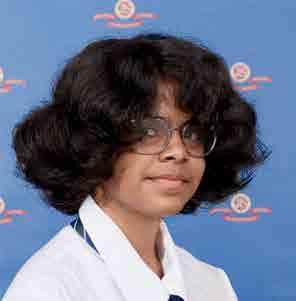
What I find most challenging about Year 9 is adjusting to the new timetable, along with the higher expectations and responsibilities. But I’m also excited about the many opportunities to try new things. This year, I joined the Student Council again because I love the leadership opportunities and the chance to help guide younger students.
Overall, being a middle school student at JIS helps you grow in so many ways and opens doors to new experiences and opportunities. Being a part of the Meerkat Family has been a true honour.
Being a boarder at JIS and part of Ibis House Boarding has been an incredible experience. From the moment I stepped into the Boarding House, the friendly teachers and welcoming community made it feel like a second home.
My day begins with a hearty breakfast in the Boarding Canteen, where I enjoy the variety of meals served. The structure of the day, from engaging classes to co-curricular activities (CCAs), allows me to explore new interests, challenge myself, and grow in confidence. Evenings in the Boarding House balance productivity and relaxation, with study periods helping me stay on top of academics and common rooms offering time to unwind. My housemaster and tutor are always approachable, ensuring we’re well-organised and providing support whenever needed.
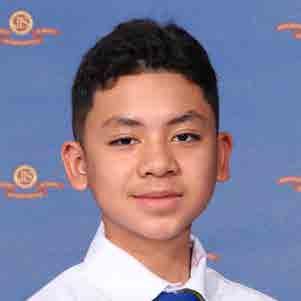
One of the best aspects of boarding is the sense of community and diversity. I’ve made friends from all over the world, learned about different cultures, and enjoyed special events like House competitions and themed dinners that bring everyone together. Boarding has taught me independence, time management, and the value of friendships. I’m proud to be part of this vibrant environment and look forward to creating more memorable experiences.

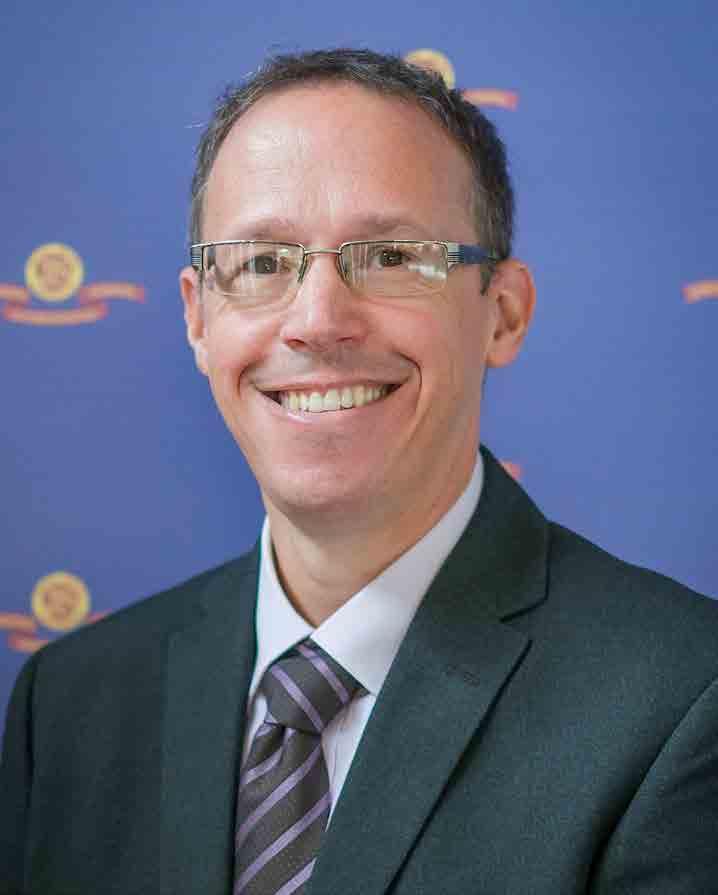
The Middle Years mark an exciting phase of discovery and growth at Jerudong International School. Incorporating Years 7, 8, and 9, this is where students lay the foundation for their future successes in the Senior School. Our vibrant and inclusive community fosters an environment where every individual is challenged, supported, and inspired to flourish.
At JIS, we value the traditions of a holistic, independent school education while embracing forward-thinking practices and diverse global perspectives. Our aim is to nurture well-rounded individuals who excel academically, thrive creatively, and grow emotionally, morally, and socially. Many of our students have gone on to achieve places and scholarships at leading independent schools worldwide, reflecting the strong academic foundation built in these years.
In line with our commitment to transformational education, we strive to educate the whole child. This means creating opportunities for excellence across six key areas:
• Academic Achievement: Cultivating curiosity, resilience, and critical thinking.
• Creativity: Encouraging expression and innovation.
• Social Development: Building empathy, collaboration, and leadership skills.
• Physical Development: Promoting well-being and an active lifestyle.
• Emotional Development: Supporting self-awareness and resilience.
• Moral Growth: Inspiring integrity, respect, and global citizenship.
These values are brought to life through dedicated and professional teachers who know their students well, providing engaging and personalised learning opportunities. Our enriching co-curricular programme includes school trips, Middle Years Enrichment Week, Co-Curricular Activities (CCAs), and special events such as Peace Day, International Day, Earth Day, and House competitions. Students are encouraged to play an active role in assemblies, tutor group activities, and Personal, Social, and Health Education (Lifeskills) lessons, embodying our core values - to respect, challenge, and inspire.
The Middle Years represent a transformative period in a child’s life, full of opportunity and discovery. While students navigate the physical and emotional changes of adolescence, they are encouraged to embrace challenges and pursue their passions. We believe that a happy, engaged, and active student is one who will thrive, both inside and outside the classroom.
We recognise the vital role parents play in guiding their children’s education. By working in partnership, we can ensure that each child’s journey is enriched and their potential maximised. Together, we share the responsibility of reinforcing key values:
• Engage: Fully participate in lessons and learning opportunities.
• Commit: Embrace the co-curricular life of the school.
• Respect: Demonstrate tolerance, understanding, and kindness toward others, contributing to an environment where all belong.
We are excited to collaborate with you in shaping a meaningful and impactful educational experience for your child.
Welcome to the Middle Years, where every day is an opportunity to grow, lead, and inspire.
Dr. Daniel Milner
VICE PRINCIPAL & HEAD OF SENIOR SCHOOL

Jerudong International School is an academically selective school that follows the British International School system. We have the Patron’s Accreditation from COBIS and are a Beacon Status School, we are an accredited IB World School and a HMC School. Our schooling goes from Nursery through to Year 13. Our school year is from late August to early July. We have approximately 1680 students from 45 nationalities.
The Junior School is Nursery to Year 6. The Senior School comprises Years 7 to 13. Years 7-9 are known as the Middle Years, with class sizes up to a maximum of 22. Years 10 & 11 culminate in the IGCSE and class sizes are usually a maximum of 20 children. Years 12 - 13 are known as the Sixth Form or Pre-University and we offer the A-Level Programme, the International Baccalaureate Diploma Programme (IBDP) and the Pearson BTEC Level 3 Extended Diploma.
The School is situated on an extensive 120 acre single campus with outstanding facilities. The campus is divided into ‘zones’ for different purposes e.g. Junior School, Boarding and a Middle Years area; so whilst the campus is extensive, it is not daunting for new students joining us. We work very hard to help students settle and familiarise themselves with the campus. Our outstanding facilities include 27 science laboratories, specialist classrooms, Performing Arts Centre, an Outdoor Discovery area, Sports Complex plus more.
Our qualified and experienced teachers are primarily from the UK. All employees of the School are safety checked and police screened prior to employment. The average length of time that a teacher stays in JIS is 8 years! This means that we have a stable teaching community who are invested in the students.
1
1
Parents and teachers together play an important role in educating children and need to support each other in order for their child to be as successful as possible. We welcome parents into the school and appreciate all offers of help. Parents work alongside staff and children in a variety of roles including student reading, assisting on school excursions and as leaders of Co-Curricular Activities (CCAs). We approach parents to request help with specific tasks but we welcome any skills or expertise that parents feel they can offer. The relationship between staff and parents is open and friendly.
We value good communication with parents and recognise the importance of keeping channels of communication open to ensure all students have a positive and successful experience during their time in JIS. Communication is regular and occurs in formal situations such as Parent Meetings, Parent-Teacher Consultations, written reports and during informal situations such as a brief chat at the end of the day. Teachers are happy to make an appointment to meet with parents, or speak on the phone, if there are any specific concerns or questions concerning your child. The school also offers information directly to parents through the Parent Portal on Firefly. Parents can access data on attendance, timetables and achievements as well electronic versions of reports for their child. You can also follow us on a range of social media, including Instagram, X (formerly Twitter), Youtube and Facebook.

The school calendar is posted on the school website: https://www.jerudonginternationalschool.com/school-life/calendar
26 August - 12 December 2025
Mid-Term Break: 20-24 October
6 January - 19 March 2026
Mid-Term Break: 16 - 23 February
6 April - 3 July 2026
Mid-Term Break: 25 May - 1 June
End of Term Holiday: 13 December 2025 - 4 January 2026 End of Term Holiday: 20 March - 5 April 2026 End of School Holiday Starts: 4 July 2026
The School Day starts at 7.30am, Monday to Friday. We expect our students to be punctual and on site by 7.25am. School finishes at 3pm for Senior Students, Monday - Thursday. It finishes at 11.45am on Friday. Co-curricular activities can take place before or after school. Some additional activities are also on offer at the weekends.
Regular attendance at school is a key factor in ensuring your child’s academic success at school. Please ensure that your child attends school as often as possible and arrives punctually at 7.25am. The attendance register is taken each morning and also in each lesson. If your child is late to school it is important that you notify the School office and your child’s Tutor in order to update the register. If for any reason your child needs to be excused from PE lessons or other school activities, it is important that they bring a letter of explanation and hand this to their Tutor or subject specialist. We strongly discourage parents from taking their children on holidays during term time. This is likely to have a negative impact on their educational development and may affect their final I/GCSE examination results.
At JIS, we believe strongly in the education of the whole child and encourage them to make the most of all of the opportunities available to them. Although academic work is important, education is not just about acquiring paper qualifications. The promotion of essential physical and personal skills such as communication, cooperation and problem solving skills, leadership where appropriate, form the focus of the extensive Co-Curricular Activities programme. All activities are designed to excite and enthuse students, encouraging them to willingly offer input, challenge their understanding and stretch their imagination. These are significant opportunities and they offer our students the chance to develop personal skills and qualities which will stand them in great stead throughout their lives. Each term students make their selections based on the wide range of activities on offer. Students sign up by going to JIS School Buddy link: https://jis.schoolsbuddy.net (Only available to students from their first day in school).

Students should not be on the premises after 5:00 pm, unless they are attending a CCA or Ugama lessons. They should be picked up promptly at the end of the day or after a CCA or swimming lesson.
Students can enrol in the School’s Instrumental Music Programme. Students receive tuition in an instrument of their choice with a specialist music teacher. These lessons are scheduled during the school day. Individual and shared lessons are available. Parents are able to hire instruments from the Music faculty. Fees for this programme are additional to the tuition fees. For more information about this programme and the fee structure contact the Music secretary or the Head of Music at music@jis.edu.bn
Firefly is our online learning platform that brings together students, teachers and parents. It allows us to set homework, track progress and share resources. Firefly makes it easy for students to access all the resources they need to stay organised with their school work and homework. It helps students:
• Stay organised and submit work, from any device.
• Access learning resources from anywhere.
• Collaborate with teachers and peers.
Parents can also be involved with their son or daughter’s learning. They can:
• Check homework and timetables for their son or daughter.
• Access their son / daughter’s School Report online.
• Engage with their son or daughter’s learning.
• Access a large amount of general information about the Houses and subjects.
• Access a ‘Parent Information’ section with lots of useful information e.g. Menus etc.
• Access the ‘Events’ to find out what is happening in the School
Parents can access the Firefly Platform from their child’s first day in school.
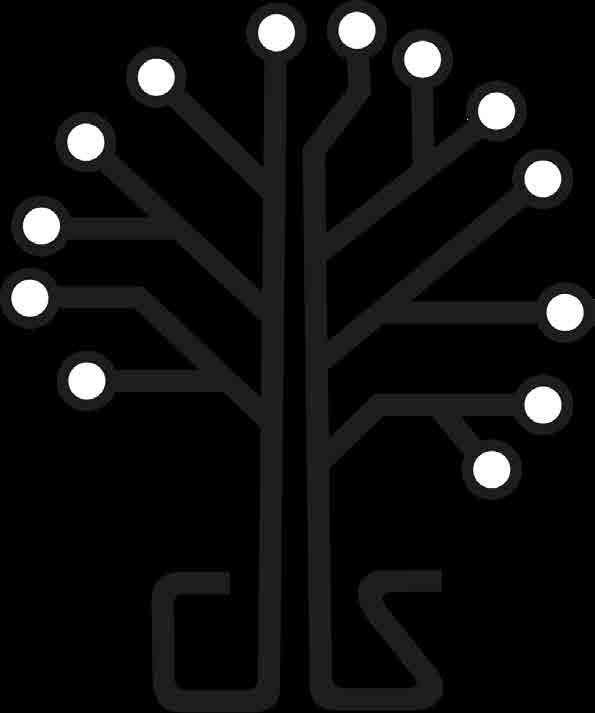
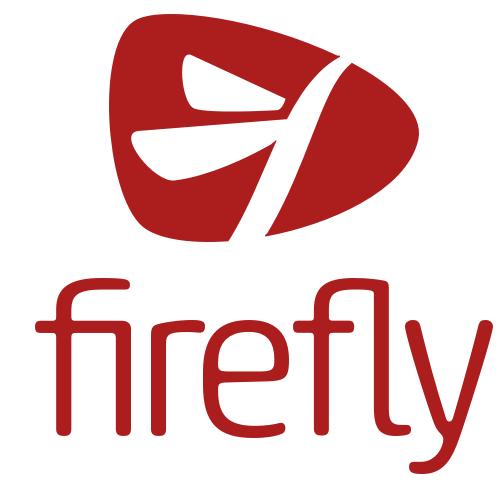
The School campus has full WiFi access and all students have access to the School’s network. Students are given an account name and password for access. The School has an excellent website which provides information about the school and its curriculum. The address of the website is www. jerudonginternationalschool.com. Once enrolled in the school, students have access to Firefly - a learning portal. This is also used by parents and teachers, with different permission levels. Parents can access personal information about their child as well as detailed information about the curriculum and life in school.
Digital learning is key to ensuring that every student gets the most out of their JIS learning experience. Our policy of anytime, anywhere learning has led to students using prescribed digital devices to access the sitewide Wifi.
This easy access to technology provides many opportunities to assist our students organisational and planning skills. By using their device to access Firefly, our live planner, they will have up to date information regarding assembly, CCA, House, and sporting arrangements. They will also have quick access to their lesson timetable and can easily email staff for help and advice.
Students are expected to behave responsibly with technology and once they have been given a login name and password they are expected to read and complete the ICT Acceptable Use Policy form to ensure that they use these facilities in accordance with the school’s terms and conditions. Parents are also required to sign this form. This form, combined with our internet filters helps us keep students protected and safe. All students in Years 10 and 11 are expected to bring their own digital device (Chromebook or laptop) to use as a learning and organisational tool.

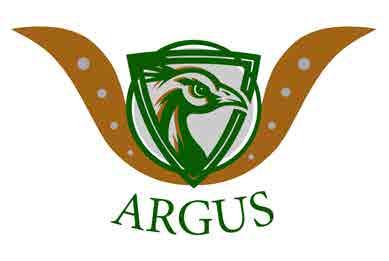

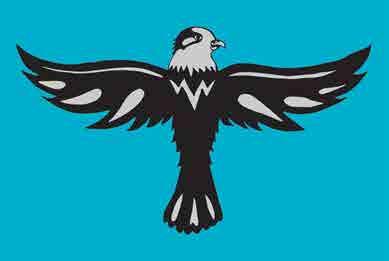
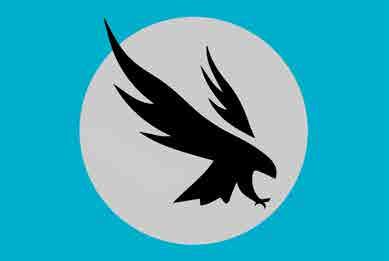
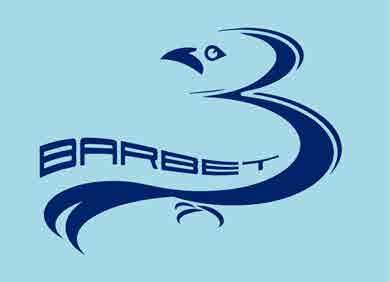

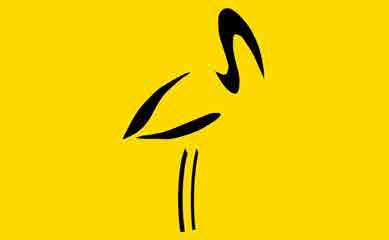
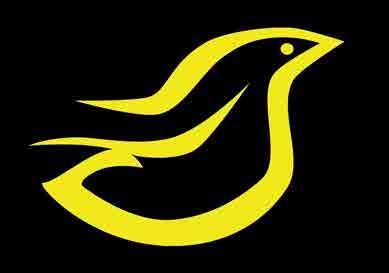
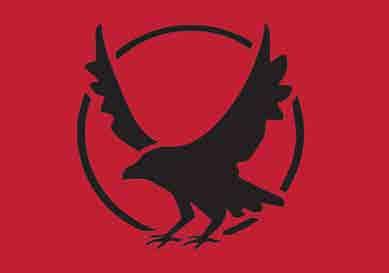
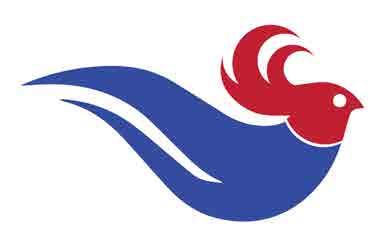
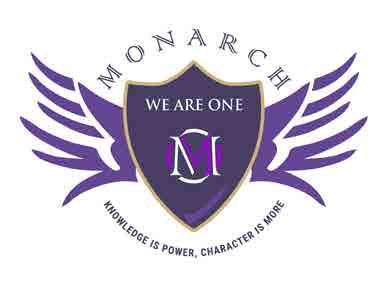
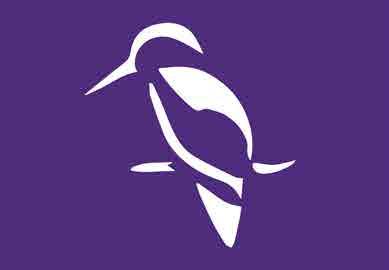
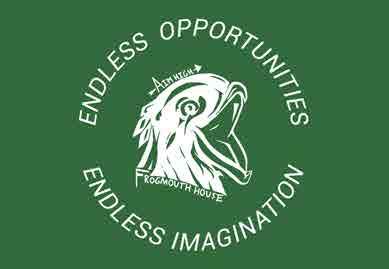
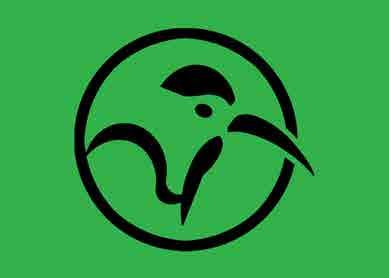
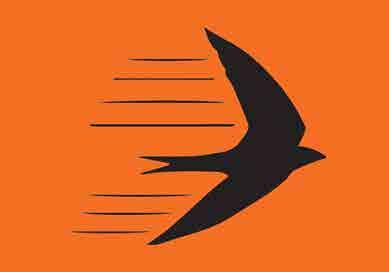
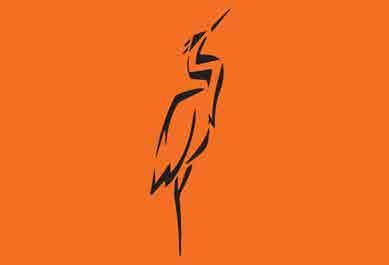
All Senior School students (Years 7–13) are allocated to a House. A House is a community of up to 70 students. There are eight girls’ Houses and eight boys’ Houses, with each House having a brother / sister House of the opposite gender. The House system is in place to provide an avenue for pastoral care, competition and camaraderie amongst the students. Siblings of the same gender are placed in the same House upon enrolment.
As Jerudong International School has a strong boarding community, four of these Houses are for boarding students, and thus for Boarding students they actually live in their ‘House’ too! The remaining twelve Houses are for day students. Boarding Houses are partnered with Day Houses which encourages Boarders and Day students to meet.
The Houses at JIS are named after birds native to Borneo. Students easily identify who is in their House by their individual house ties and House T-Shirts. A House Captain and Deputy Captain are selected for each House and they are assisted by other students in different leadership positions, unique to each House. During the school year Polio Points are awarded for a variety of reasons in line with the whole school aims. These can be demonstrated in lessons and in wider opportunities including competitions, academic or personal achievement, sportsmanship, kindness and cooperation. At the end of the year the overall winning House is presented with the House Trophy.
The Head of the House is a teacher who is the Housemaster / Housemistress who has overall responsibility for the academic and social development of the students in their House. The students are allocated into tutor groups for each House. The tutor groups for students are split into Years 7–9 and Years 10–13. Each morning, Monday to Thursday, from 7.30 am–7.45 am, students will attend tutor group where they will register for school but also have the opportunity to do a variety of activities which may range from chatting with their tutor about a number of topics, planning for House events or having homework diaries checked. Every Friday morning, there is a longer ‘House’ period from 7.30 am–8.25 am, known as FridayOne. During FridayOne, House assemblies can be held or the students have the opportunity to go into greater depth for a number of support issues such as coping with exams, academic life as well a life beyond the lessons that they have here at JIS.

The Houses provide a wonderful opportunity for many different activities. Every Thursday afternoon, after school, are House sporting competitions e.g. football, netball, rugby and swimming—to name just a few! Once a week, other House activities occur such as lunchtime Music Performance, the ‘War of Words’—the House debating competition; Spelling Bee, House Quizzes, the list is endless! Every student becomes passionate about their House and supporting their friends within their House. Parents are encouraged to develop a relationship with their child’s tutor and also the Housemaster or Housemistress so that JIS and parents can work together to help each child fulfil their maximum potential.
In addition to the House Leadership teams, students can nominate themselves to be on the Student Councils.
Years 7-9: There are Councils for Year 7, Year 8 and Year 9.
Years 10-13: There are councils for Year 10, Year 11 and Year 12. Year 7-13 students can all also join the Senior School Council.
There are also a range of leadership opportunities such as Eco-JIS, WellBeing and an Equity, Diversity and Inclusion Group.
The role of the Senior School Council is to help create positive change within the Senior School community. To create, amend and improve the systems and structures the School has in place, to act as a voice for the students in the Senior School and lastly, to create a shared ethos and bond the four year levels together. The Council also plays a key part in helping students transitioning to the school and to make everyone feel part of the Senior School family.
The Senior School Council comprises students from Years 7-13. The Senior School Council meets with the Vice Principal - Head of Senior School once a week to discuss ways to improve the school. Then it is up to the Council. The Senior School Council is involved in many activities around the school, such as acting as ambassadors by conducting school tours for visiting students and guests, organising social opportunities for the year groups as well as leading whole school events such as Peace Week and International Day. The Head Students meet with the Principal once a month and speak with him about making real change within the whole School that hopefully benefit all students in the Senior School.

Year 7 Middle Years Council
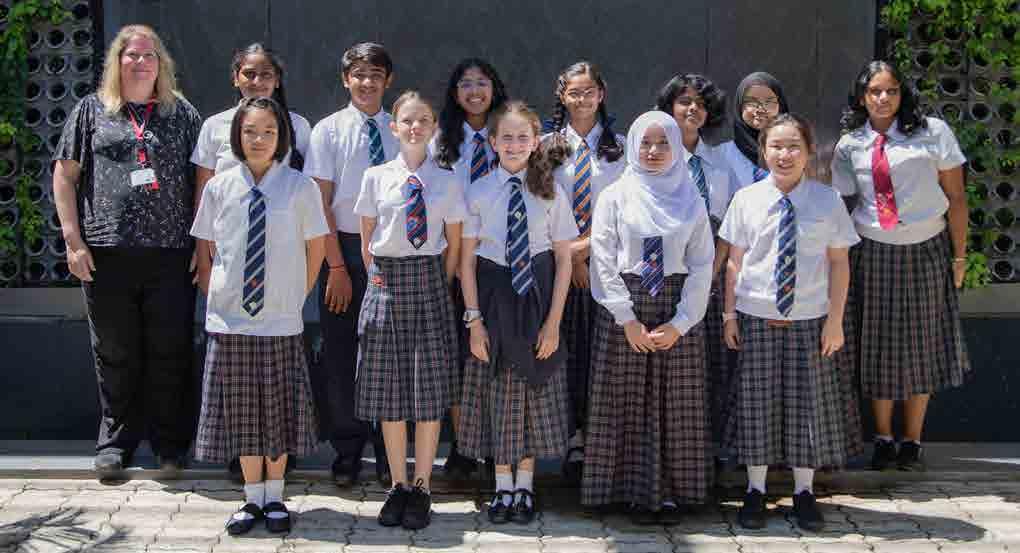
Year 8 Middle Years Council
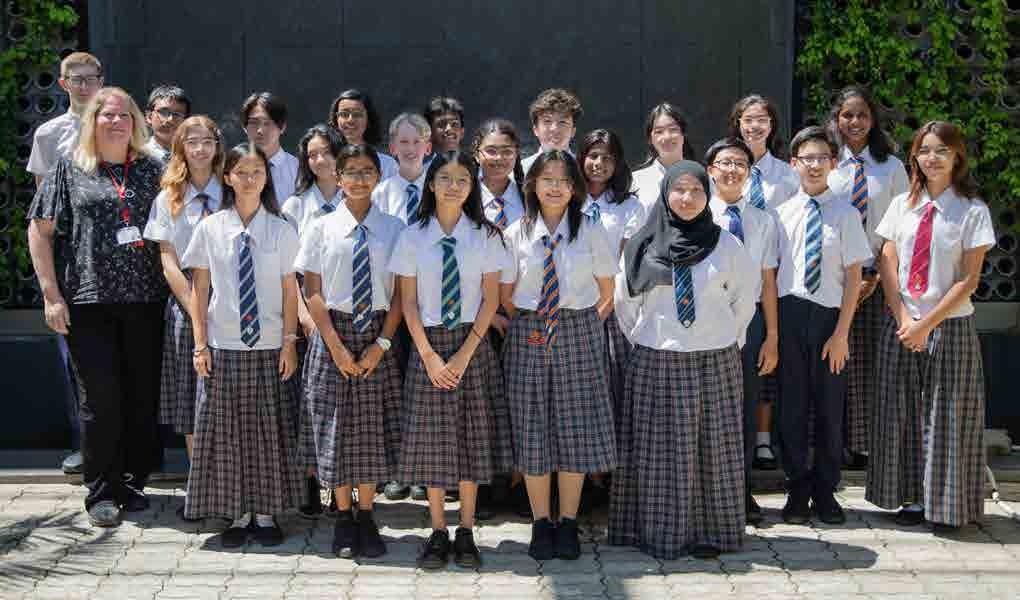
Year 9 Middle Years Council
This is a student led initiative across the whole School. Polio Points are earned by following the Student Aims both in and out of lessons: Communication, Engagement, Resilience, Thinking, Leadership and Integration. A set of 6 polio points (one per school aim) is then used to purchase a polio vaccine through UNICEF to help in the effort to contribute to the worldwide eradication of the disease.
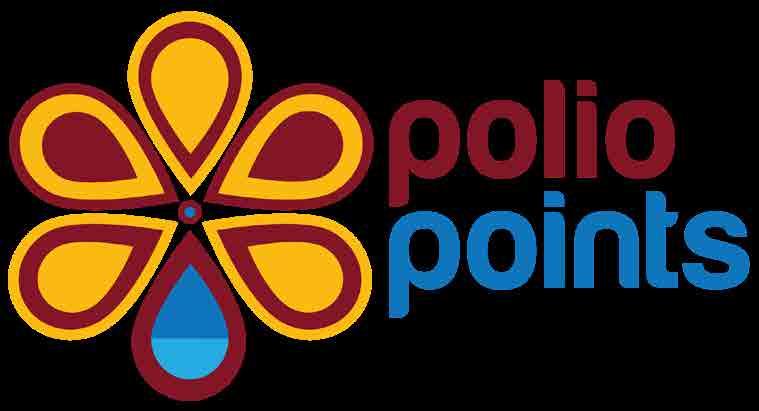
As a School, we want to encourage our students to do well as well as think of others. Polio Points empowers our students to make a difference to the lives of some of the most vulnerable communities in the world. Although Polio Points is an external organisation (http://teaspoonsofchange.org/) the students at JIS have worked to adapt the idea to fit the school aims and what they think will benefit the students as a system of rewards. By this Scheme, our students improve the lives of other children around the world.

In addition to the Polio Points scheme, the school also supports other charities, such as the Borneo Project and Penan Support group, to name a few. Student-led activities are organised throughout the academic year and are integrated with the key learning objectives in our curriculum. We take pride in the JIS community for its unwavering support of local charities and less fortunate communities.
An integral part of the education in the School is the range of field trips and excursions which students experience. These excursions broaden a student’s understanding of work that is being covered in class in a practical and enjoyable way. We have worked hard to develop excellent opportunities within Brunei to ensure all our students can experience a truly holistic educational experience. Year 7 to Year 9 - Residential Trips (1 night) e.g. Temburong Years 10 to 13 - a range of trips linked to subjects and / or CCAs e.g. International Award (Duke of Edinburgh).
JIS has a well equipped Health Centre staffed by 3 registered nurses. As well as treating any child who has an accident or feels unwell during the school day, the Health Centre works with students and families who have long term health conditions or needs. The service links in with other pastoral care providers in the school providing a multidisciplinary approach to student well being.
It is important that the emergency contact information given to the school is current, as this ensures timely contact with home and allows for swift communication of all needs between home and the Health Centre. If you are out of the country please ensure that your child’s classroom teacher or house master is notified with an emergency contact. On admission or during your child’s time at JIS, the health centre should be notified or updated regarding any medical conditions (long or short term) so that adequate support can be provided while your child is on site. This information is treated confidentially and only shared to staff who have contact with the student.
Please let us know immediately if your child is unwell and inform us of any medical diagnosis that may result in the spread of an illness to other students or staff. If it is something that can be passed on to others, keep your child at home. If they are recovering from an illness and are not able to take part in Physical Education lessons, inform us by letter.
In the event of a minor accident or sickness, children are taken to the nurse in the Health Centre and given first aid and made comfortable until they are able to return to class. If an injury causes us concern or hospital treatment is required we first seek the advice of the nurse and then make every effort to contact a parent or the listed emergency contact as soon as possible. Where this is not possible we will make arrangements to accompany and transport children to hospital and seek further medical advice. If appropriate the services of an ambulance will be used.
No form of medication is allowed to be held by students on site in both the Junior and Senior schools. All medication required must be handed into the health centre and a consent form completed. These medications may be for long term conditions or for a short term treatment but must be given to the Health Centre Staff and not kept in students bags or lockers. Teaching and Administrative staff are not allowed to give out medication on school site - for school trips they undertake training and are able to administer when off site.
Students must use sun protection (and insect repellant) on exposed skin if they are outside for an extended time. School hats are worn outside and students are encouraged to make use of available shade. All classrooms have a supply of sunscreen for the children to use. All students must have a hat which they wear at break and lunchtimes. We operate a ‘No Hat, No Play’ policy for students wishing to play sports on the school fields.
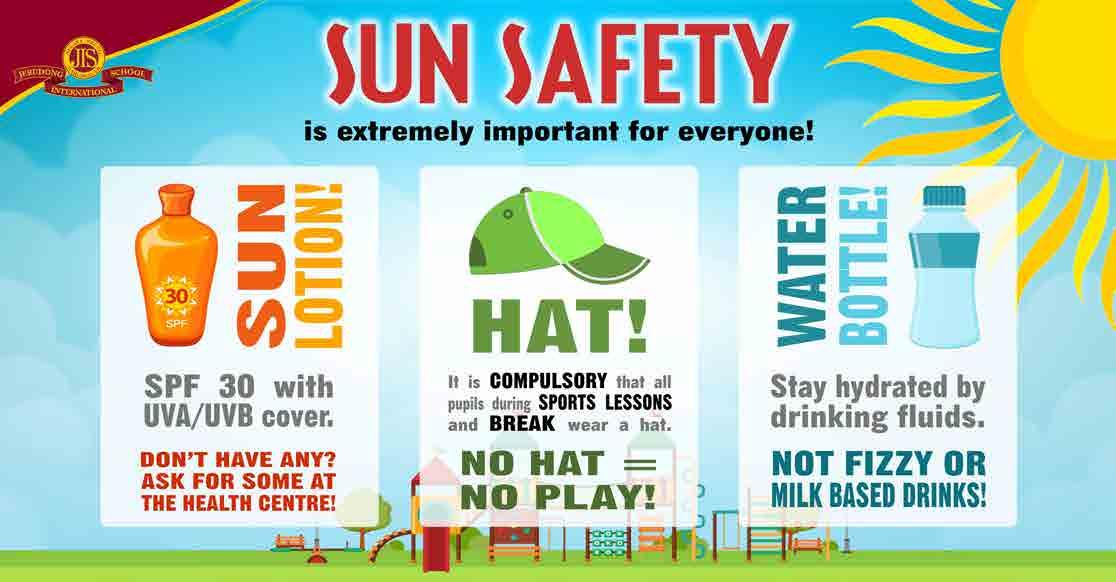

Jerudong International School (JIS) believes that a clear uniform policy plays a valuable role in contributing to the school ethos. We expect all who attend JIS to have a high standard of appearance whilst wearing school uniform whether inside or outside of school.
The purpose of this policy is to provide clear guidance to students, teachers, parents and other stakeholders about the expectations of the school with regard to uniform and appearance and the strategies used to maintain a high standard at all times.
At any time that students wear school uniform they are representing the school and must wear the appropriate uniform in the appropriate manner. It is important that the school uniform is worn correctly. The uniform is available for purchase from the stationery and uniform shop.
• The Principal and School Academic Leadership Team are responsible for ensuring the policy is followed.
• House Masters, House Mistresses, Tutors and class teachers (Junior school) are responsible for checking uniform daily.
• School staff, including teaching and support staff, are responsible for ensuring that the policy and procedures are followed and consistently and fairly applied.
• Parents and carers are responsible for ensuring that their son or daughter wears the correct uniform inside and outside of school.
• Students are expected to take full responsibility for their own appearance and will be made fully aware of the school policy, procedures and expectations.
The Assistant Head of School will judge if a student is inappropriately presented and may, after liaising with the relevant Vice Principal, send a student home to return properly dressed.
Parents should check with the Housemaster or Housemistress if they have any doubt about the suitability of items of clothing they intend to buy for students to wear in school.
Shoes that are all
be
- stitching, lacing, edging around the base of the shoe. No coloured flashes, labels or logos. Plain white / black socks only.
Long Navy Blue Tailored Trousers
School Tie
Trousers need to be loosely hanging. Tight fitted trousers are not allowed. Plain blue / brown / black belt only. Long Black trousers only for Year 12 & 13.
Years 7-11: House Tie
Years 12-13: Maroon Tie
• Underwear should not be visible.
JIS white and maroon dri-fit shirt (long / short sleeves).
JIS maroon dri-fit shorts / track pants. Appropriate footwear for the sports activity e.g. trainers, football boots etc.
JIS Jumper / Cardigan Only official JIS jumpers / cardigans are allowed to be worn in and around school.
• Hair should be neat and clean. Hair should not touch the shoulders.
• Extreme styles or garishly coloured hair are not allowed.
• No jewellery or makeup should be worn.
• Tattoos are forbidden.
• Earrings / ear studs are forbidden (unless for religious or cultural reasons).
• No facial hair may be grown unless it is for religious reasons, whereby written permission should be obtained from the Head of School.
• Coloured contacts are acceptable so long as they are of a natural colour (green, blue, brown etc.). Contacts of unnatural colours e.g. red or purple are not allowed.
• Headphones should not be worn around school.

White Collar Button Shirt Short Sleeves / Long Sleeves. Black Shoes
JIS Tartan Skirt
Midi Length (just below the knees) OR
Full Length (by the ankles)
Religious Headscarves Plain white / black only.
School Tie
Years 7-11: House Tie
Years 12-13: Maroon Tie
• Underwear should not be visible.
PE Kit
Shoes that are all black should be worn - stitching, lacing, edging around the base of the shoe. No coloured flashes, labels or logos. Plain white / black socks only.
JIS white and maroon dri-fit shirt (long / short sleeves).
JIS maroon dri-fit shorts / track pants. Appropriate footwear for the sports activity e.g. trainers, football boots etc.
JIS Jumper / Cardigan Only official JIS jumpers / cardigans are allowed to be worn in and around school.
• Hair colour must be natural and style and must be appropriate (at discretion of the school) for school (no unnatural highlights or multi tone colouring).
• Hair should not obscure the eyes and hair that falls below the shoulder should, if requested, be tied back whilst in school.
• Girls in Years 7-11 should not wear make up in school. Sixth Form girls may wear discreet foundation.
• Girls in Years 7-11 should not wear nail varnish in school. Sixth Form girls may wear subtle/natural nail varnish. False nails should not be worn.
• Girls may wear ONE flat signet ring, ONE small stud in the lobe of each ear, ONE bangle & ONE necklace (except during PE and some practical lessons).
• Tattoos are forbidden.
• For health and safety reasons, other forms of body piercing jewellery are not allowed (discreet nose studs are allowed for cultural and religious reasons).
• Coloured contacts are acceptable so long as they are of a natural colour (green, blue, brown etc.). Contacts of unnatural colours e.g. red or purple are not allowed.
• Headphones should not be worn around school.
PE kit can only be worn to school if students have PE Period 1. On Friday no student should be coming to school in PE kit unless permission has been given by the HsM. Students should (on most occasions) change out of PE kit at the end of PE lessons.
Clothes should be worn that are appropriate for a school environment. Shoulders and midriffs should be covered and shorts or skirts should be of an appropriate length. Logos on clothes should be non-offensive.
The health, safety and well-being of every child at Jerudong International School is our prime concern. We listen to our students and take seriously what they tell us. Our aim is that children will enjoy their time as students in this school. We also want to work in partnership with our parents to help each child to achieve their full potential and make a positive contribution. The school has a Child Protection Policy in line with this for the safety of all. This Child Protection Policy is available to parents on our Firefly Parent Portal. If you are at all worried about the welfare, health or safety of a child please speak to the school counsellors or your child’s Housemistress / Housemaster or Head of Senior School.
JIS is committed to providing the whole school community with a modern, healthy menu and dining experience. We are constantly working on ways we can improve the food offered in our school canteens. Our aims are always to focus on freshly prepared food with great variety that is both nutritious, delicious and attractive. Students in Years 7 - 11 eat their snacks and lunch at the ‘Borneo Pasar’ Canteen. Students in Years 12 & 13 eat their snacks and lunch at the ‘Hornbill’ Canteen.
We have two halal certified caterers - Serikandi and Grazestar who both operate in these canteens. They offer a varied and extensive range of items served from different kiosks. They can cater for any special diets requested and daily vegan / gluten-free and vegetarian hot meals are available. The variety each day includes a hot food station (Western and Asian choices), Salad bar, Pasta station, Sushi and Rice Boxes, ‘Make your own Sandwich’, Live Grilling, Fresh Fruit Sices and Juices and Grilled Cheese Sandwiches. All food purchases are offered with a free salad pot.
Parents can view the menus on the Firefly parent portal and meals can be pre-ordered. Students purchase food using credit on their Campus Card account. For Boarders, a daily credit value is automatically added. For day students, parents can add credit by paying cash to Accounts or


paying online. Parents can also set a daily limit for their child. All menu items are available for pre-ordering via the online Campus Card account. Daily menus are available via Firefly. The Firefly food pages also have monthly updates of new items added to the menus. There is an active food committee open to all Senior School students for food tasting and feedback sessions are held during lunch times each term.
The School is committed to recycling / reusing and reducing waste and so we encourage parents to provide their children with a container to collect their lunch. Students will also bring their own water bottles and fill them using the water fountains. Water jugs and beakers are also available in the Borneo Pasar Canteen and Hornbill Canteen.
All parents are issued with a security ID Pass and also a car pass which allows them to access the school campus. Parents are required to wear their Parent Pass when on the school campus.
Children in Years 7-11 will visit the School Library as part of their school curriculum. However, JIS parents are welcome to register as Community Borrowers. This will allow parents to borrow books for their own personal enjoyment or/and to borrow additional books for their children. Parents are welcome to visit the library 7.30am - 8am each morning (Monday - Friday) and 3pm - 4pm (Monday - Thursday).
Ugama is the study of Islam. It is taught in the Malay language (Bahasa Melayu) and is compulsory for all Bruneian Muslim students in Years 2 - 8. Classes commence at 3.00pm on Monday to Thursday and 2.45pm on Fridays. Please contact ugama@jis.edu.bn for more information.
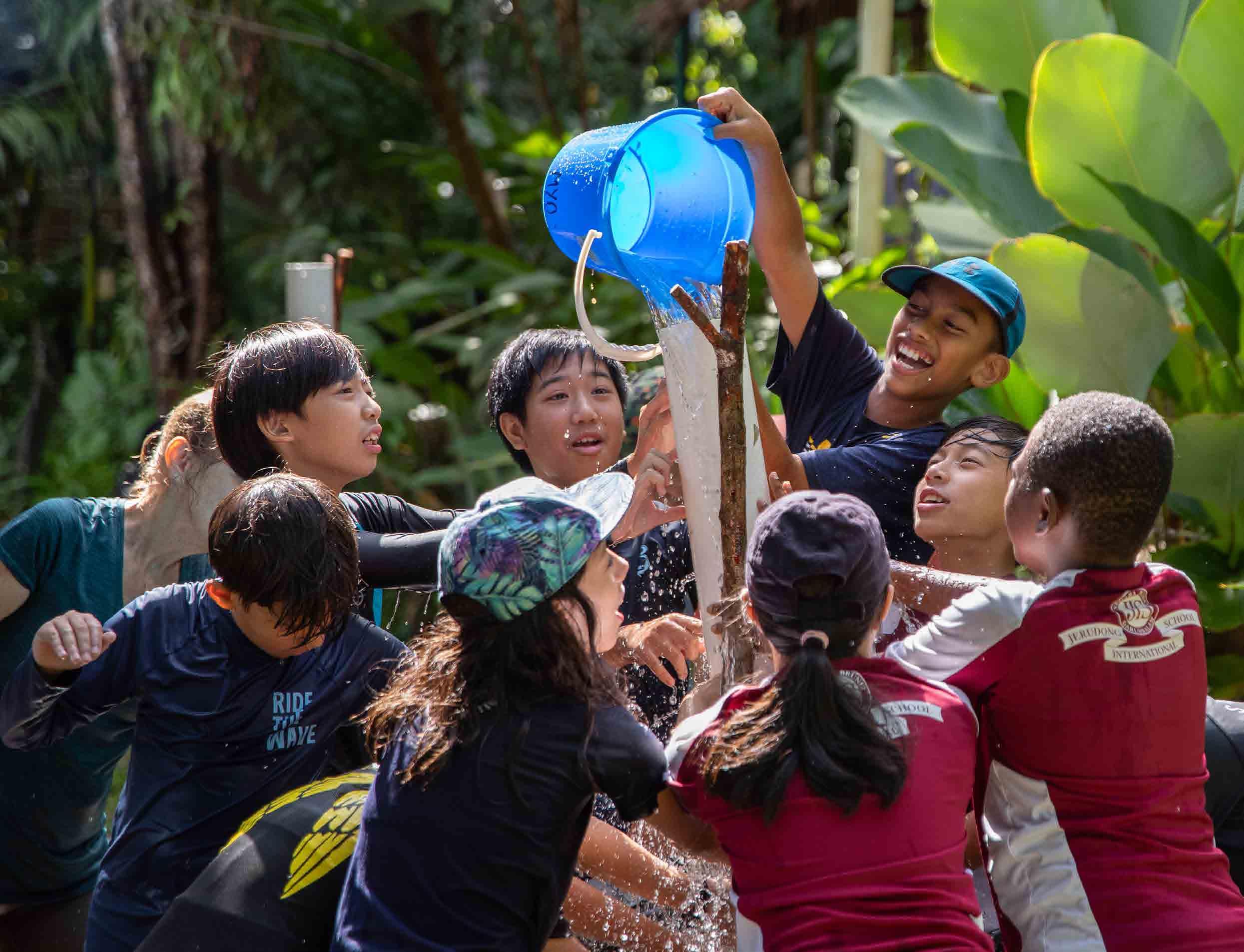

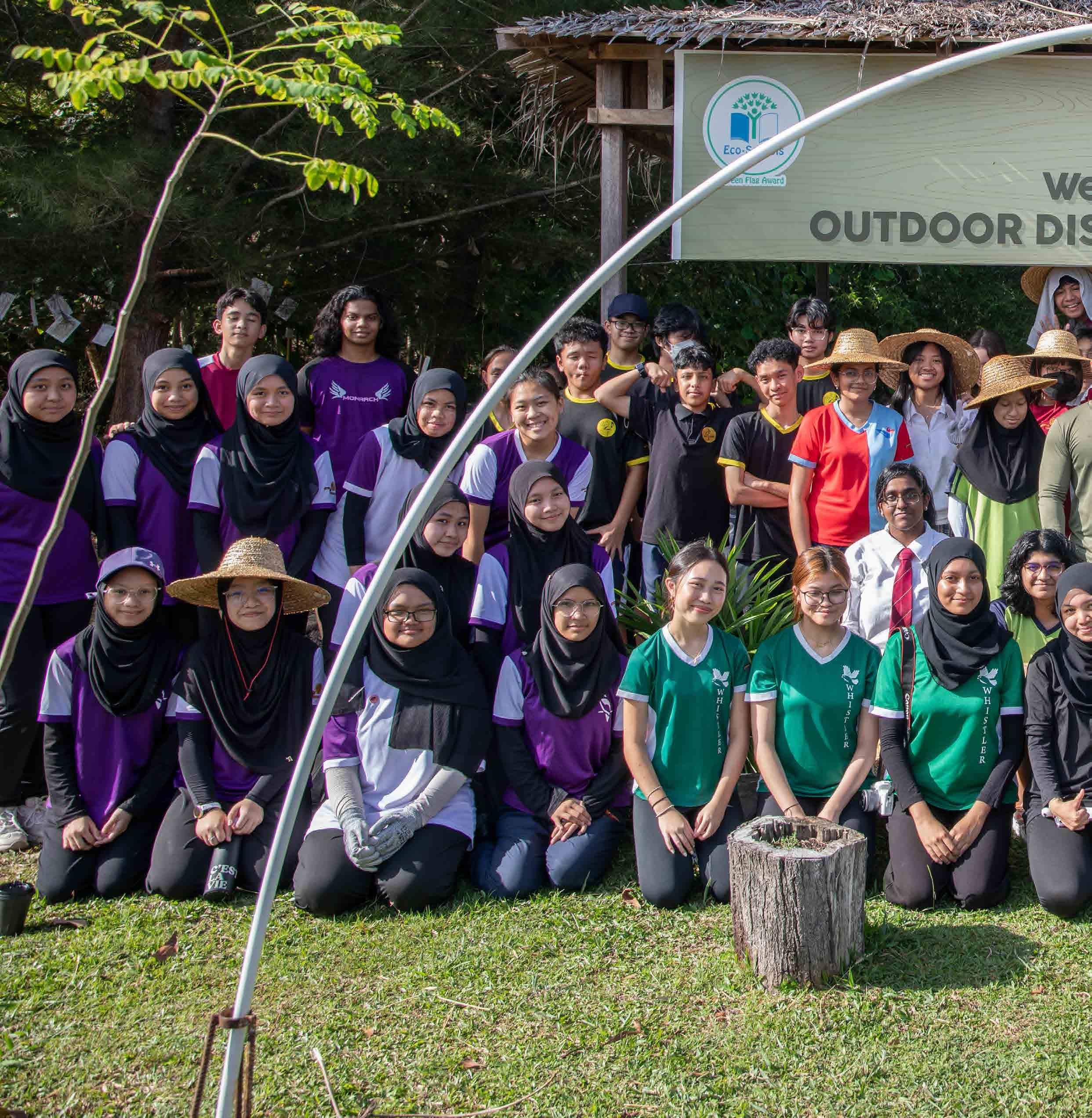

The pastoral system at Jerudong International School (JIS) is unique and focuses solely on providing the most comprehensive support network for our students as possible. FridayOne is a time for students to integrate, participate in house events and seize opportunities for leadership and personal challenge. Students are defined not only by the content they learn at JIS but also the relationships they build and it is essential we guarantee time for these bonds to develop. Every Friday morning the students have an hour of the week that is set aside as pastoral time and falls under three central strands: House time, Tutor time and Lifeskills.
House time gives the Housemasters/mistresses (HsMs) of our 16 Houses the opportunity to create shared experiences for the students in their care. These activities strengthen the strong feeling of community at JIS of which we are so proud and allow students to get to know one another and make friends across
all year groups. The HsMs create a programme for the students to learn the key house values and grow as individuals.
Tutor time allows focused time for tutors and students to meet to discuss academic progress and plan strategic interventions. The tutor is the first step towards solving the small issues that can impede a student’s academic progress. A strong bond within a tutor group offers one of the most important layers of pastoral support here at JIS.
Lastly, Lifeskills at JIS aims to equip students with the knowledge, self-understanding and social, emotional and intellectual skills necessary to live a healthy, safe and wellbalanced life and to achieve their full potential both at JIS and in later years. A well designed Lifeskills programme can be a powerful tool in helping students overcome problems and the JIS Lifeskills programme draws on established practices, but

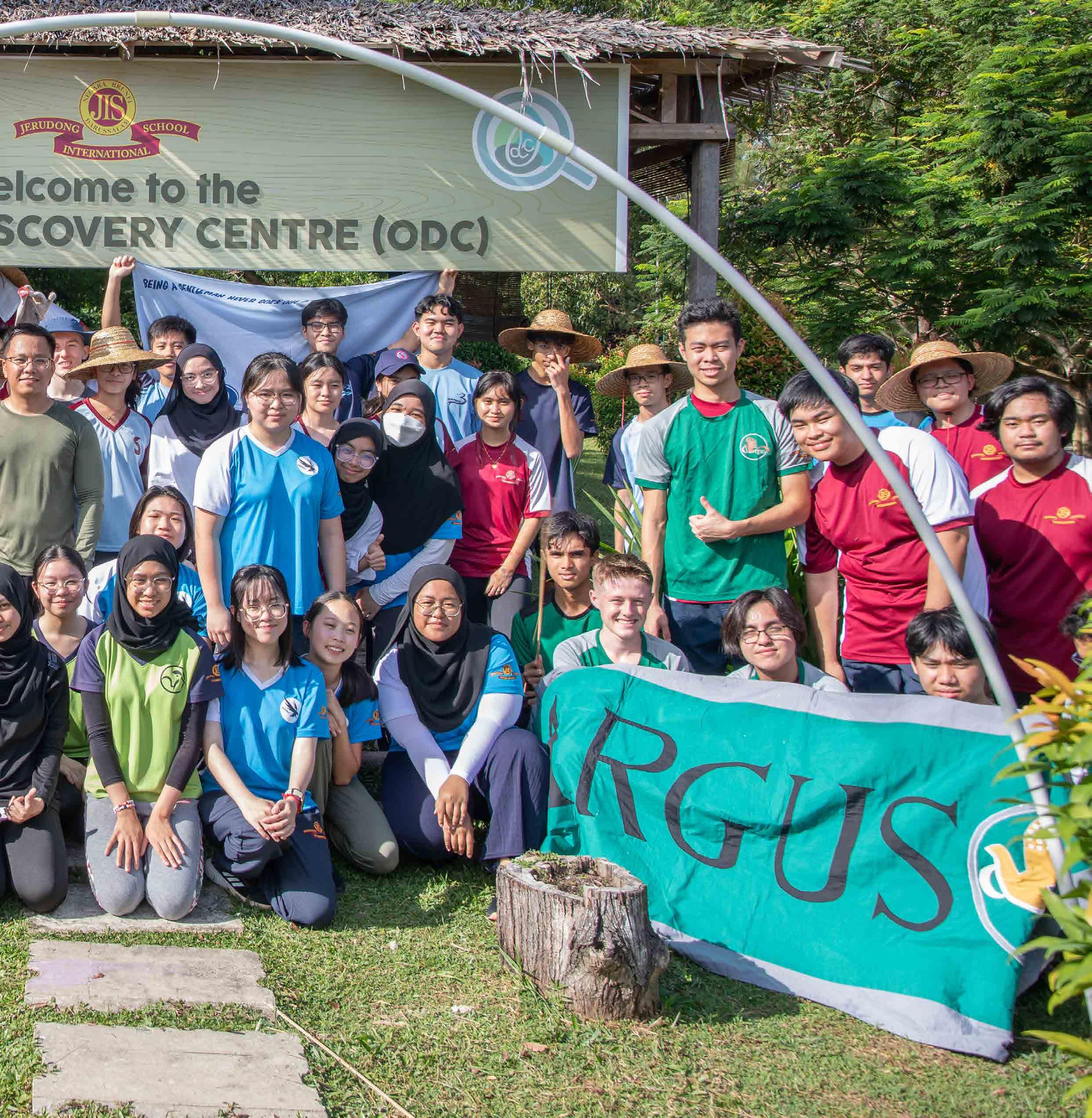
has been tailored to reflect the exact demands of the students living in a Bruneian and international school context. It aims to give the students an awareness of the need for balance in life and the impact that neglect of one area, such as physical or emotional health, can have on their performance in other areas, including academic success.
Whilst it is considered important to make students aware of the risks associated with harmful practices, the Lifeskills curriculum at JIS takes a positive, preventative approach, aimed at empowering students with the self-awareness and emotional resilience required to confront the challenges of life. Lifeskills is organised around three strands that have been chosen through consultation with the HsMs and the students themselves. They cover the three key focuses of physical health, emotional health and intellectual health. In the Middle Years (Year 7-9) these strands are labelled Friendships, Healthy living and Emotional

Resilience. In the Upper Years (Years 10-13) the same values are continued but delivered through Relationships, Global Citizenship and Mental Health. In Year 12 we have embedded the Higher Education programme into FridayOne. In Year 13 the students embark upon a course entirely focused on their departure from JIS and, for many of them, a move to university in a different country other than their own. With this in mind the students go through a series of sessions focused on preparing for Independent Living.
At JIS we are committed to educating the whole child and consider FridayOne to be the most important hour of the week.

The JIS Middle Years curriculum is based on the National Curriculum of England but is specifically determined by the needs of the students who attend JIS. It is enriched by an emphasis on the relevance of the cultural, religious and geographical context of Brunei, achievement in the performing arts and sport as well as an expectation of awareness for important global issues.
The Middle Years aims to facilitate the cognitive development of students. This is characterised by a concentration on the acquisition of basic skills in language, literacy, numeracy and information technology. We also look to develop the skills of conceptualisation, analysis, reasoning and the application of basic skills over a wider range of experience. In this way, students can begin to appreciate the wider world and begin to develop notions of their place within it and their contribution to it.
As a result, the key elements in this phase of the curriculum are:
• Continuing emphasis on the development of basic skills, building toward a successful transition to I/GCSE.
• Continuing emphasis on assessment for learning techniques.
• Focusing on the development of higher order thinking skills.
• Encouraging the development of independent thought, not only by teaching and learning opportunities but also by an increasing amount of extra curricular and wider school initiatives.
All students are entitled to an appropriate curriculum that is broad, balanced, differentiated, rigorous and relevant to student needs. In addition to their academic progress this will cater for their creative, social, physical, emotional and moral development.
The Middle Years curriculum is broad in that it offers all the subjects required as part of the UK National Curriculum with an enriched performing arts, sporting and extensive extracurricular provision.
In Years 7 and 8, all students are taught Humanities (History and Geography), Arts, Science and Technology with cross-curricular links between them. In Year 9 the students are given the opportunity to specialise in their chosen language selection as well as studying Physics, Chemistry and Biology as individual sciences for the first time. As a result, students should have a well-rounded educational experience with enhanced cultural, sporting and language provision.
Throughout the Middle Years, students are placed in mixed ability teaching groups. However, setting takes place in Mathematics during Years 7, 8 and 9. Year 7 - 9 are placed in teaching bands. Each English band will consist of three or four mainstream classes and one E2 class (English as a Second language class). E2 classes will be taught by a specialist EAL teacher.
Students in need of specialist help are identified and facilities and specialised teaching are made available to them after consultation with their parents. These groups tend to be categorised as Learning Support groups or Language Support groups. Although a different style of delivery may be found within each teaching group throughout the Middle Years, the delivery to each group will be characterised by its rigour and the high expectations by staff of their students.
The holistic education provided by the academic curriculum, the FridayOne curriculum, enrichment opportunities and co-curricular activities aims to ensure that all students develop academically, creatively, socially, physically, emotionally and morally whilst they are within the Middle Years. This approach ensures the foundations for success at I/GCSE are developed before the students reach Year 10.
To broaden the experiences offered to the children and to enhance the development of their skills and understanding, a variety of other opportunities are planned within the academic year. These include Enrichment Days (such as Language Days, Science Day or History Day), Peace Week, International Week, Earth Week and Book Week.

There are also a number of key co-curricular activities available to students. These include the Middle Years Plays, Orchestra, Choir, Outdoor Education, Middle Years MUN and a wide variety of sports (refer to PE Curriculum and Games Curriculum).
The Learning Support Faculty provides support for students who may have additional learning needs. Learning Support Tutors provide some in class support in the core subjects. Students may also receive small group withdrawal to enhance their basic skills in literacy, mathematics and organisation. Handwriting and reading intervention programmes are offered where needed. These may take place before school or at lunchtimes. The provision offered by the Faculty is flexible and is dependent on the needs of the individual and the needs of the cohort.
Digital learning is key to ensuring that every student gets the most out of their JIS learning experience. Our policy of anytime, anywhere learning has lead to students using a prescribed digital devices to access the sitewide Wifi. For Years 7-9, each student is required to have a Chromebook.
This easy access to technology provides many opportunities to assist our students organisational and planning skills. By using their device to access Firefly, our live planner, they will have up to date information regarding assembly, CCA, House, and sporting arrangements. They will also have quick access to their lesson timetable and can easily email teachers for help and advice.
Students are expected to behave responsibly with technology and once they have been given a login name and password they are expected to read and complete the ICT Acceptable Use Policy form to ensure that they use these facilities in accordance with the school’s terms and conditions. Parents are also required to sign this form. This form, combined with our internet filters helps us keep students protected and safe.
Students entering the Middle Years will also benefit from initial training in the use of Google and their devices. Student Digital Captains in each House and the PSHE programme will support students with the more difficult elements of using the internet, i.e. navigating the internet safely and what to do should you feel you are being bullied online.
We are extremely lucky, the facilities within our school allow us to use some of the latest digital content in our classrooms and learning spaces making for exciting lessons and engaging learning environments. Our digital goal at JIS is to use this technology to communicate clearly, collaborate with each other, think critically and be creative.
Homework is one component of the holistic education of a child. Homework can help to foster the positive development of motivation, curiosity, and confidence. It can contribute toward building responsibility, self-discipline, and life-long learning habits. Homework can also provide opportunities to deepen understanding. However, co-curricular activities are also an essential part of the holistic education of a child, as are activities outside of school and family experiences.
Given the busy lives of our students we need to maintain a healthy balance between academic development, commitment to co-curricular activities and a busy home and family life. We believe that there should be Core Homework tasks that every child should be able to complete on the evenings of Monday to Friday. In addition there should be Extension Homework tasks that children may explore if their curiosity and love of learning so drives them. The purpose of each is explained below.
• To prepare for a concept or a unit that will be studied in the future.
• To provide opportunity to integrate newly learned concepts and skills with prior learning.
• To provide practice or reinforcement for what students have learned in the classroom.
• To provide independent practice and reinforcement of proper study habits taught in school.
• To provide opportunity for increasing self-direction, time-management, and independence through extended project work.
• To finish off work that has not been completed in class.

To elaborate, enrich, and/or extend the understanding of a student through self-inquiry and self-application.
All students should read for approximately 20 minutes each night. This should be at least one or two chapters. They should complete an Accelerated Reader Quiz after each book they have read. This will be motivated by their English Teacher.
One or two homework tasks.
English
Maths
Sciences
Languages
History
Geography
Approximately 60 minutes a week.
A number of short homework tasks. Approximately 60 minutes a week.
One homework task.
Approximately 30 minutes a week.
English
Maths
Biology, Chemistry, Physics & Geography
One homework task per language. Approximately 20 minutes a week. Languages
One homework task.
Approximately 60 minutes a fortnight.
Extended homework tasks. Approximately in 4 week units.
History
Art & Design, Design & Technology, Drama, Computing, Music
One or two homework tasks. Approximately 60 minutes a week.
A number of short homework tasks. Approximately 60 minutes a week.
One homework task. Approximately 30 minutes a week.
One homework task. Approximately 45 minutes a week.
One homework task. Approximately 60 minutes a fortnight.
One homework task. Approximately 30 minutes a week.
Teachers will use a variety of formative and summative assessment techniques to assess the progress of students and to inform teaching and learning. Assessment data is used to inform setting decisions in subjects such as Mathematics and English, as well as to identify students in need of support or extension. Housemasters/ Housemistresses liaise with their tutors to ensure that there is an ongoing system of monitoring as part of the pastoral system. Tutors are in daily contact with students.
In the Middle Years we hold annual exams in most subjects during Term 3. Most exams will take place during the week prior to the Term 3 halfterm holiday, usually in May. The internal exams are formal assessments that measure what all children can do when they are asked the same questions. For all Middle Years students assessments will be conducted for English, Languages, Mathematics and Science. Those subjects that are not tested are practical subjects within which an assessment task is better carried out over a few weeks or intermittently throughout the year, i.e. Art, Drama, Music, Design & Technology, Computing, Geography and History.
The purpose of the exams is to provide staff, students and parents with information about the extent and quality of learning. Such feedback will identify areas of strength and weakness in each subject. Students will also gain experience of working under exam conditions and practise answering the type of questions set in external exams. Such familiarity will improve exam techniques. The scripts will be returned and discussed with each individual in class.
The exams will act as only one piece of assessment amongst many others that have been completed during the academic year. All the assessment tasks will contribute to the end of year course grade which will be recorded on the final report. Students who have enrolled during the academic year may sit a specially prepared exam or they may sit the same exam as other students in their year group. Subject teachers will explain to students the policy adopted by their faculty.
These two subjects follow the Pearson Edexcel International Lower Secondary Curriculum. This ensures accurate benchmarking of academic assessment as well as allowing an easy transition into the IGCSEs which follow the same exam board.

These subjects work in conjunction to enhance the English Language skills of our students. The curriculum are carefully designed to support students with the full range of English Language skills. This means that all of our students are able to access the linguistic requirements of the IGCSE programme.
Taken together the core subjects in the Middle Years at JIS focus on the core skills of literacy, numeracy, speaking and listening as well as the development of ICT skills.
Whilst JIS is a selective school with the majority of its students being of above average ability, teaching and learning will be differentiated to meet the needs of all students whether through the provision of extra support or through appropriate extension and challenge.
JIS is faced with the challenge of providing a curriculum that includes both a first language subject (Bahasa Melayu) and foreign language subjects (Foreign Language Malay, Foreign Language Mandarin, Foreign Language French, Foreign Language Spanish).
Given the additional complexity of having a very high proportion of students for whom English is an Additional language (EAL), there are various options for how the total language provision may be established for a student.
In total, four one-hour lessons are allocated each week to the development of Languages. The combinations available are:
• Bahasa Melayu - This course is taught for all four lessons. This recognises the fact that it is a first language course and that it is essential for a C grade to be achieved at O-level for Bruneian students to have access to educational scholarships.
• Foreign Languages - Students choose two languages (one Asian Language and one European Language), each of which will be studied for two lessons per week.
• English as an Additional Language (EAL)
- Students who have EAL needs may study one foreign language for two hours and then attend a Language Support class for two hours.
- Students who have significant EAL needs may attend an English Language Support class for four hours.
Each student’s work is marked and reported using grades. A grade describes the standard of work or the degree of attainment in a subject. Students receive regular reports throughout the academic year. Teachers are asked to report on attainment as well as organisational skills and attitude to learning. Parents are also invited to attend meetings with their child’s teachers and/or tutor to discuss their progress.

Teachers consider Organisation for Learning and Attitude to Learning when grading your child: Organisation for Learning
• Being equipped for their lesson;
• Remembering their exercise book;
• Submitting their homework on time;
• Preparing themselves to work effectively in class; and
• Being punctual to each of their lessons.
Attitude to Learning
• Communication in whole class and group situations;
• Inquiring about the work being studied;
• Independently completely work;
• Reflecting on their own learning; and
• Showing an interest beyond the curriculum.
Both Organisation for Learning and Attitude to Learning are measured as follows:
Exceeding Expectations
Meeting Expectations
Working Towards Expectations
Below Expectations
This grade is awarded if a student significantly exceeds expectations given a student’s ability. The student is exceptionally hard working.
This grade is awarded if a student is meeting most of all the school’s expectations.
This grade is awarded if the student is meeting some of the school’s expectations but there are areas where improvement is needed.
This grade is awarded if the student is meeting few to none of the school’s expectations.
If a student is below expectations in a number of grades, parents will be contacted by the Housemaster or Housemistress of their child.
Following feedback from students, parents and teachers a new reporting model has been adopted for Year 7 students. The model used increases the level of contact between school and home and focuses on the study skills we believe are essential to foster student achievement at the end of Year 7, and beyond.
• September - A ‘Meet the Tutor’ evening . This is an opportunity to meet the tutor who will be the main contact between school and home over the time your child is in the Middle Years (Year 7-9). A detailed explanation of the year’s reporting schedule and description of the grading structure will also be presented.
• December - A Parent-Tutor Evening. At this Evening, parents will receive a set of Attitude, Organisation and Achievement grades from each teacher. This will be given to you by the Tutor who will explain the grades whilst providing holistic feedback regarding your child’s first term in Year 7. The tutor will also discuss, and agree with you and your child, a set of targets moving forward that will have the greatest impact on your child’s progress during Term 2 and 3.
• January/February - A Parent-Teacher Evening. At this evening, parents will receive a full set of grades from each teacher and have an opportunity to discuss them with the subject teachers. The Targets set in December with the Tutor will also be reviewed by the subject teachers.
• June - A full written report.
• October - ‘Meet the Tutor’ evening. You will receive a set of Attitude, Organisation and Achievement grades from each teacher.
• December - A full written report. A Parent-Tutor Evening. At this Evening, parents will receive a set of Attitude, Organisation and Achievement grades from each teacher. This will be given to you by the Tutor who will explain the grades whilst providing holistic feedbzack regarding your child’s first term in Years 8 & 9. The tutor will also discuss, and agree with you and your child, a set of targets moving forward that will have the greatest impact on your child’s progress during Term 2 and 3.
• February/March - A Parent-Teacher Evening. At this evening, parents will receive a full set of grades from each teacher and have an opportunity to discuss them with the subject teachers. The Targets set in December with the Tutor will also be reviewed by the subject teachers
• June - A full written report.
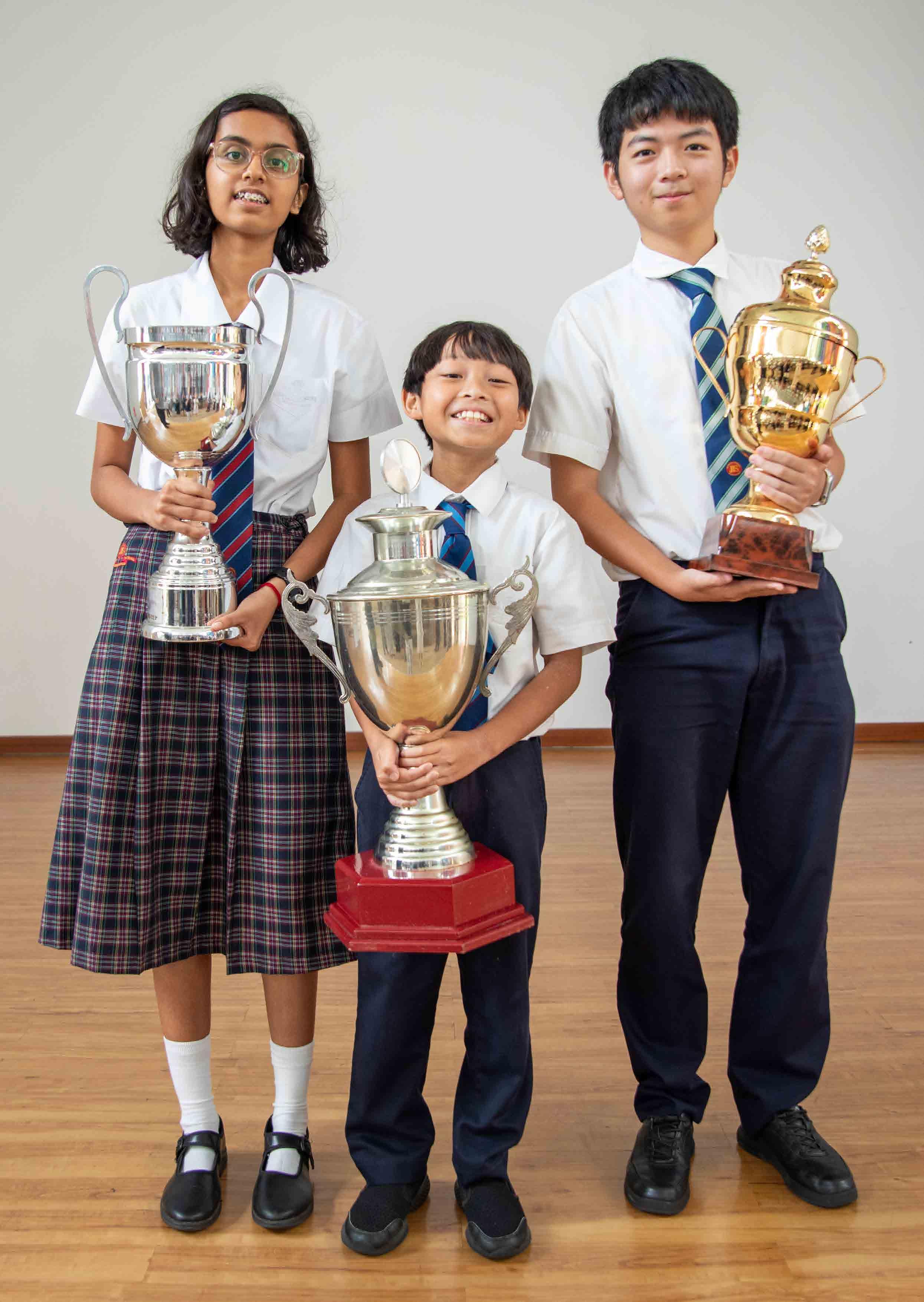

‘The English Faculty believe that their role as teachers is to promote a love of learning alongside a love of the English language and its literature. In doing so, we aim to raise students’ awareness of the world around them by exploring the global richness and diversity of English language and literature.’
To achieve this aim, students in the Middle Years undertake a number of units throughout the year.
Students study a range of literature including a novel, a play and poetry with the complexity of the text increasing for the appropriate age and ability of students. In addition, they cover units that focus on different media, argumentative writing, writing for newspapers and creative writing. For instance, a student in Year 7 may study a text such as ‘Skellig’ by David Almond but will be expected to handle the more challenging ‘Animal Farm’ in Year 8 and ‘Heroes’ in Year 9. Non-Fiction texts in magazines and newspapers as well as visual texts will also be covered. Oral work is a significant component of the course and students are encouraged to debate in class as well as being given more formal opportunities to promote their oral ability. It is the intention of the programme to foster an appreciation of literature as well as a steady improvement in written and spoken English.
A regular feature of each year levels is the promotion of reading through one lesson per fortnight being spent in the library. This is an opportunity for students to interact with teachers and peers to discuss and choose appropriate age level texts.
A number of co-curricular activities are offered to students within the English Department. Students are encouraged to enter Essay Writing competitions and in recent years JIS students have participated and achieved well in the FOBISIA short story competitions as well as the COBIS Poetry competition.
Throughout the Middle Years, students in English are assessed in two key ways. During each unit of work, from Non-Fiction and Media to each year’s Play Study, a standardised assessment is held. These assessments focus on the key skills communicated in each unit, and have a ladder of progression across each year group culminating in IGCSE style assessments in Year 9 in preparation for starting the IGCSE course in Year 10. This allows teachers to gain a complete picture of each student’s progress in key areas, both across the year and across the whole of the Middle Years. Additionally, an end of year exam is held for each year group, which focuses on the key skills they have covered across the academic year.
JIS is a wonderful mix of nationalities, cultures and languages and approximately two thirds of our students are developing their English as an additional language. Some may be further along than others and have already acquired the academic English they need for accessing the curriculum at JIS.
English as an Additional Language (EAL, or sometimes called E2) students operate daily in at least two languages and this adds significantly to their ‘thinking load’. In addition, learning the curriculum through an additional language while, at the same time, encountering the new concepts and culture, is often a significant challenge. It is therefore important that we pay attention to the acquisition and development of language skills. The EAL provision is as follows:
Intensive Language Programme (ILP)
• 11 lessons of withdrawal.
• Classes are very small, often on a one-to-one with dedicated ILP teachers.
• ILP classes are for students with a CEFR level of A1, beginner, or A2, elementary.
Language Support
Students get extra English Language Support lessons to help develop their English, as well as support in accessing the language in their other academic work.
Language Support is for students with a CEFR B1, intermediate level of English language proficiency.
English & History Curricula in an E2 Classroom
Students are taught the same content as mainstream students but in a differentiated, more EAL focused environment.
These classes are for students with a CEFR B1, intermediate and B2, upper intermediate, level of English language proficiency.

Introduction
The EAL Faculty provides special assistance to students who are deemed to require more help in building English proficiency. The aim is to help students cope with the language demands of their various subjects. In Years 7 and 8, depending on degree of need, students can be invited to take Language Support on one or both of the timetable language lines. Language Support works in tandem with parallel English and History and as proficiency improves, students first exit Language Support, then, when the time is right, move into mainstream English and History.
• The language support provision is available at all year levels within the school. Students work in small groups, receiving help with the language aspects of their subjects, for example, through the use of glossaries and learning the conventions of writing genres typical of certain subject areas.
• Teachers are available to students as a ‘language resource’ to help them clarify assignment tasks and coursework requirements, and assist in the development of strategies to meet the language demands of subject-derived reading and writing tasks.
• Language Support teachers write a report which features an effort grade and comments on students’ progress, effort and motivation.
EAL Middle Years students follow the same curriculum as mainstream English students but in a smaller, more supported class.
‘The English Faculty believe that their role as teachers is to promote a love of learning alongside a love of the English language and its literature. In doing so, we aim to raise students’ awareness of the world around them by exploring the global richness and diversity of English language and literature.’
To achieve this aim, students in the Middle Years undertake a number of units throughout the year.
Students study a range of literature including a novel, a play and poetry with the complexity of the text increasing for the appropriate age and ability of students. In addition, they cover units that focus on different media, argumentative writing, writing for newspapers and creative writing. For instance, a student in Year 7 may study a text such as ‘Skellig’ by David Almond but will be expected to handle the more challenging ‘Animal Farm’ in Year 8. Non-Fiction texts in magazines and newspapers as well as visual texts will also be covered. Oral work is a significant component of the course and students are encouraged to debate in class as well as being given more formal opportunities to promote their oral ability. It is the intention of the programme to foster an appreciation of literature as well as a steady improvement in written and spoken English.
A regular feature of both year levels is the promotion of reading through one lesson per fortnight being spent in the library. This is an opportunity for students to interact with teachers and peers to discuss and choose appropriate age level texts.
Year 9 is an important year for consolidating essential literacy skills learnt in the Middle Years and for further developing an appreciation of the way writers create meaning. We achieve this through our study of a wide variety of fiction and non-fiction texts. In Year 9 we aim to provide firm foundations for the IGCSE courses by ensuring thorough coverage of the three key areas for assessment: reading, writing and speaking and listening. EAL students can enter the IGCSE ESL course or move to IGCSE Language Only.
Throughout the Middle Years, students in English are assessed in two key ways. During each unit of work, from Non-Fiction and Media to each year’s Play Study, a standardised assessment is held. These assessments focus on the key skills communicated in each unit, and have a ladder of progression across each year group. This allows teachers to gain a complete picture of each student’s progress in key areas, both across the year and across the whole of the Middle Years. Additionally, an end of year exam is held for each year group, which focuses on the key skills they have covered across the academic year.

Students in Years 7, 8 and 9 will be studying the Maths Progress International 11-14 course. The aim of the course is to create confident and numerate students ready for the International GCSE (9–1). The course follows a mastery approach that aims to nurture confidence, build fluency, improve problem-solving skills and develop mathematical reasoning to fully prepare students for the transition to International GCSE and beyond.
Maths Progress International includes a Student Book and Workbook for each student as well as online digital resources. Each chapter of the Student Book has sections called Check, Strengthen and Extend. These sections can also be used at home to further support students’ learning. The Check section contains a short quiz which can be used for students to check their understanding of the relevant chapter. The Strengthen section can then be used for students who need to further develop their understanding of that particular chapter. The Extend section is for students who fully understand the ideas from the relevant chapter but want to extend and deepen their understanding further.
The Year 7, 8 and 9 curriculum is a knowledge-rich curriculum, as shown through the broad range of topics covered over the course. Within each topic, the aim is to give our students the opportunity to master each concept, make connections with other topics and develop their problem-solving skills further. Each section of the book is designed to help our students to become self-motivated, independent learners with the confidence and resilience to solve challenging problems. The quizzes in the Check section are an opportunity for students to test their knowledge and understanding. Students are then encouraged to reflect on this and complete either the Strengthen or Extend exercises for further support or challenge, as required.
• After each topic, students will be given a topic quiz. This will either be on paper or online and will give our students a clear idea of anything within each topic that requires further practice.
• There will be a broader and longer in-class review test after every three topics. This will give students the opportunity to review topics throughout the course of the year.
• Towards the end of the term, students will sit an end-of-year exam. This will allow students the opportunity to review all of the topics from the course and to reflect on their learning for the year.
We encourage our students to see all topic quizzes, review tests and end-of-year tests as an opportunity to test their understanding, reflect on their learning and improve their skills and knowledge.
Students in Year 7, 8 and 9 are expected to complete short, regular tasks after most lessons. The idea behind these short, regular tasks is to develop our students’ habit of practising Maths “little and often”. We believe this is the most effective way to build our students’ fluency and confidence in Maths.
There are many opportunities for Maths outside the curriculum at JIS. Students are invited to take part in the Mathletes CCA, where we investigate fun-puzzles and practice team challenges such as Sprint Maths, team logic puzzles and crossnumbers. We continue to run the UKMT Maths Challenges, as well as the follow-on Olympiad and Kangaroo competitions. And of course, we have our annual Maths Week where we invite guest speakers (James Tanton, Colin Wright and Simon Pampena) and take our time to investigate fun and exciting topics - from the Cracking the Code (our code-breaking Maths Week) to the Mathematics of Juggling. We hope your child learns to love and appreciate Mathematics during their time with us in Year 7-9.
Mathematical investigations are also an integral part of the Year 7, 8 and 9 curriculum. As well as being extremely enjoyable and engaging, Mathematical investigations also expose students to the idea of problem-solving. It is important to give students the opportunity to tackle open-ended tasks that require a systematic approach in order to solve them. These are designed to not only develop curiosity about maths but also to offer students of all abilities the opportunity to improve their problem-solving skills. These tasks are simple to start with but offer great scope for students to formulate more general solutions to the initial problems and to apply their skills in context. Students will complete several investigations during Y7, 8 and 9.

The nature of Mathematics means that it, of course, has very close links with Science, Computing, and Design & Technology. However, there are links with many other areas of the curriculum including Music, Art and Sports. The Middle Years problem-solving approach to Mathematics brings different subjects together, allowing the students to apply their Mathematical understanding to solve problems from a wide variety of subjects. The course has been carefully designed to align well with other subject areas, primarily Science. This course-design allows students to meet a concept in Maths (for example Speed-Time graphs) at the right time, ready to further develop their skills in Physics.
One of the reasons, amongst many, for choosing this course is that there is a clear progression between the topics studied in Year 7, 8 and 9 and those on the IGCSE course.
Middle Years Science at JIS is an exciting environment where students develop an understanding of what it means to be a scientist. This is not just in preparation for the IGCSE, A Level and IB Diploma Science courses, but with the intention of developing and enhancing the fascination and excitement many young people feel about the natural world. Our students are encouraged to recognise the power of rational explanation and develop curiosity about natural phenomena.
In purpose-built and superbly resourced laboratories, Middle Years Science is a thought provoking, investigative subject in which students find out for themselves answers to the big questions about the natural world through rigorous practical investigation and creative activities. Studying Biology, Chemistry and Physics in an integrated Science curriculum, students learn the importance of carrying out experiments to produce reliable data from which conclusions and theories can be derived, and further investigations can be suggested. The aim is that all students should leave Middle Years thinking as scientists.
We are following the Exploring Science International Curriculum. This has been designed to deliver full coverage of the content on the: UK National Curriculum Edexcel International Lower Secondary Award 13+ Common Entrance Exam.
This revised course includes real-life science our students can relate to and content for a broad and balanced science curriculum, as well as specific skills and content needed to progress to International GCSE Sciences.
Throughout the Middle Years Science curriculum, we expect students to develop practical skills and thinking skills so that they can apply the knowledge they gain to solve problems. They will plan and carry out scientific enquiries, analyse their data, communicate their findings and solve problems.
Formative assessment is regularly applied and teachers work hard to ensure that students make progress in the development of skills and understanding. Summative assessment takes place in the form of written assessments at the end of each topic. There is also an end of year examination which covers the content of the whole year.
The experiences selected for the students, within science, are such that they show the children the practical relevance of Science to everyday life and the possible technological and social consequences of Science in a world outside of the laboratory.
Year 7
• Term 1: 7A Cells Tissues Organs, 7E Mixtures and Separation, 7B Sexual Reproduction in Animals and 7F Acids & Alkalis
• Term 2: 8B Plants and Reproduction, 7J Current Electricity and 7C Muscles & Bones
• Term 3: 7G Particle Model, 7K Forces and 7D Ecosystems

Year 8
• Term 1: 7H Atoms Elements Compounds, 7L Sound, 8G Metals & their Uses, 8E Combustion and 8I Fluids
• Term 2: 7I Energy, 8F Periodic Table and 8J Light
• Term 3: 8A Food & Nutrition and 8C Breathing & Respiration
The nature of Science means that it naturally has very close links with Mathematics, Geography and Design and Technology. However, there are links with many other areas of the curriculum beyond this. The Middle Years thematic and problem solving approach to science brings different subjects together, allowing the students to apply their scientific understanding to solve problems set by other subject departments.
Biology is an expansive science that often draws upon an understanding of Chemistry and concepts in Physics and Mathematics to construct theories and models of all aspects of life on earth. Recent decades have seen significant advances, not least in molecular biology and gene technology with their increasingly important applications in medicine.
The Year 9 Biology course contains elements that we believe will best prepare them for the rigours of the IGCSE course. These can be broken down into three key components:
• Biological content: This will form the theoretical basis for further periods of study, and will provide a strong platform upon which to begin the IGCSE course. Vital Biological concepts are taught including, Cell theory, Ecology, Health and Lifecycles. These are delivered in a range of styles and formats, and use realistic applications that are modern and relevant .
• Scientific skills: Our students must become proficient practical scientists, and they have ample opportunities to develop the skills that will be needed in their ongoing education. These skills range from analysing and constructing graphical data, to microscopy and dissection. This also includes the use of a wide variety of technologies, such as data logging tools and presentation software.
• Critical Thinking: The Biology course includes many occasions where simply remembering things will not suffice. Our students will need to be able to critique and form arguments about issues relating to Biology. The course includes critical inquiry, as well as the opportunity for debate, reflection and group consolidation of the topics we teach. This encourages our students to be confident and collaborative thinkers, as well as knowledgeable Biologists.
We follow the Pearson’s ‘Exploring Science International’ scheme of learning in Year 9. Students cover the following topics:
This unit recaps ideas about the causes of variation and then looks at inherited variation in more detail. DNA is introduced before students consider how inherited genes can affect an organism’s survival. The unit ends with coverage of natural selection.
This unit looks at photosynthesis and aerobic respiration in plants in more detail, and then considers plant adaptations. The products we get from plants are then looked at, before studying farming methods and their problems.
This unit uses the context of disease to cover some basic themes in biology that will be developed in students’ GCSE science courses. These themes include the different kinds of diseases, nervous and hormonal control systems, ecological sampling, and diffusion and osmosis. A section on testing medicines provides an opportunity to study more of the scientific method and to look at the analysis of continuous datasets.
Formative assessment is regularly applied and teachers work hard to ensure that students make progress in the development of skills and understanding. Summative assessment takes place in the form of written assessments at the end of each topic. There is also an end of year examination which covers the content of the whole year. End of Unit tests can be used for teachers to reflect on actions for the class, and for heads of department to monitor progress across a year group.

External Assessment
JIS will not be arranging for the students to take the external assessment at this stage.
• 9A Genetics and Evolution - development of technology
• 9B Plant Growth - energy transfer and agriculture
• 9C Transition to further study and the Pearson’s IGCSE curriculum
The focus of Chemistry in Year 9 at JIS is the study of the concepts that underpin the subject. This is done by delving into the history of the subject, by experimenting in various ways to enhance an appreciation and enjoyment for the subject and by preparing students for specific units of the IGCSE, A Level and IB Diploma Chemistry courses.
In summary, the aims of the Year 9 Chemistry course are:
• To encourage critical thinking amongst students so that they can question, analyse, discuss and reach conclusions.
• To nurture an appreciation for Chemistry as part of the scientific world.
• To become more familiar with laboratory techniques and build the confidence to embark on further study in this field. Chemistry is delivered to the Year 9 students by a dedicated, well resourced Chemistry department which includes highly qualified, enthusiastic teachers. Teaching takes place in seven Chemistry laboratories that are fully equipped with the latest apparatus and modern, advanced teaching/education tools.
Curriculum Overview
In Year 9, we follow the Pearson’s ‘Exploring Science International’ scheme of learning, which consists of three units: 9E, 9F, and 9G.
This unit looks at the manufacture, properties and uses of different types of materials. The first three topics introduce examples of ceramic, polymer and composite materials. In each case, the properties of these materials are linked to their uses. The unit continues by looking at some of the problems caused by synthetic materials and possible solutions to these problems. In the last topic, the importance of recycling materials is considered. From previous work, most students will be able to:
• use the particle model to explain observations about matter (7G)
• explain what a landfill site is and some of the problems they cause (7G)
• describe the difference between elements and compounds (7H)
• describe examples of combustion and decomposition reactions (7H)
• explain the advantages of recycling materials (7H)
• describe how biomagnification of toxins can occur (7D & 8D)
• describe the difference between atoms, molecules and lattice structures (8F)
• model chemical reactions using word and symbol equations (8G)
• describe the sources and effects of the greenhouse gas carbon dioxide (8E)
• explain how sulfur dioxide and nitrogen oxides help to cause acid rain (8E).
• chemical symbols and formulae for elements and compounds
• the concept of a pure substance
• the identification of pure substances
• combustion, thermal decomposition, oxidation and displacement reactions
• chemical reactions as the rearrangement of atoms
• representing chemical reactions using formulae and using equations
• exothermic and endothermic chemical reactions (qualitative)
• properties of ceramics, polymers and composites (qualitative)
• the production of carbon dioxide by human activity and the impact on climate
• Earth as a source of limited resources and the efficacy of recycling
• reactions of acids with carbonates.
• Topic 9Ea Introduces examples of common ceramics like china, porcelain and glass, explains how their general properties make them useful and links the properties to their structures. It also briefly describes and compares the manufacture of glass and china/pottery.
• Topic 9Eb Introduces some examples of polymers and explains how their common properties make them useful. The topic considers how polymers are formed and how their structure helps to explain their properties. In particular, natural rubber and vulcanised rubber are used to explain how cross-links change the properties of materials. Some of the reactions involved are used to explain the difference

between exothermic and endothermic changes. There is also a Working Scientifically spread that looks at peer review, which is used to assess scientific papers before publication.
• Topic 9Ec Introduces examples of common composite materials, such as concrete, paper and glass-reinforced plastic, and explains how the properties of a composite can be more useful than its separate materials. The production of cement and concrete is explored. Some of the reactions involved, including decomposition reactions, are used as further examples of exothermic and endothermic changes. There is an opportunity to find out about STEM and the skills associated with being a materials scientist (with a focus on generation and analysis of data).
• Topic 9Ed Examines some of the problems associated with the manufacture and use of certain materials. The problems discussed include: the effect of producing soot, acidic gases and greenhouse gases by burning fossil fuels, the release of toxic substances into the environment and the detrimental effect that waste polymer materials can have on living things. Possible solutions to each problem are also considered.
• Topic 9Ee Considers some of the advantages and disadvantages of recycling waste materials. In particular, some of the issues associated with the recycling of metals, glass, paper, polymers and concrete are considered.
This unit explores these STEM skills and how they are used:
• Generation and analysis of data (fair testing of a composite material).
• Calculating mean values and percentages
• Drawing and interpreting bar charts, scatter graphs and line graphs.
Cross-disciplinary opportunities
• 9Eb – Biology 9Ac – DNA as a polymer
• 9Ec, 9Ed – Biology 9Ba – starch as a polymer, respiration and photosynthesis as examples of exothermic and endothermic reactions
• 9Eb – Biology 9Bc – protein as a polymer
• 9Ed – Biology 9Be – carbon cycle
• 9Eb, 9Ec – Physics 9Ib – changes involving energy transfer.
Cross-curricular opportunities
• 9E – History – the use of materials through the ages
• 9E – Geography – the finite nature of resources used as raw materials to make consumer goods.
This unit looks at metals through the theme of demolition. Physical changes and gas pressure are reviewed, and then the reactivity series and a chemical method of preventing rusting are covered. Exothermic and endothermic reactions are introduced, followed by displacement reactions. The method of extraction of a metal is related to its position in the reactivity series. Calculation of percentage change is related to oxidation and thermal decomposition reactions. From previous units, most students will be able to:
• recall the meaning of thermal decomposition (7H)
• recall the difference between physical changes and chemical reactions (7H and 8F)
• describe the particle model (7G and 8I)
• explain the cause of gas pressure (7G and 8I)
• recall the fire triangle (8E)
• describe what happens in a combustion reaction (8E)
• use information on the reactions of metals to place them in an order of reactivity (8G)
• recall how some elements are found in their native state and how metals are extracted from ores (8H).
• Topic 9Fa Looks at physical and chemical explosions. This is an opportunity to review previous work on physical changes and chemical reactions, and on gas pressure.
• Topic 9Fb Is a review of the reactions of metals with air, water and dilute acids. These reactions are then used to put the metals into the reactivity series. There is a review of rusting and methods of preventing it.
• Topic 9Fc Reviews the combustion of hydrocarbons and the test for oxygen. Exothermic and endothermic reactions are introduced, with ideas about reactions that need initial energy input or constant heating. Some students may consider the energy changes involved in breaking and making bonds. The Working Scientifically pages look at calculating percentage change in mass for oxidation and thermal decomposition reactions.
• Topic 9Fd Is about displacement reactions. It starts with the thermite reaction, which will lead into metal extraction in Topic 9Fe, and also discusses displacement reactions in solution. The explanation is related to the reactivity series and exothermic reactions.

This unit explores these STEM skills and how they are used: Problem-solving (creating and using inventories).
Cross-disciplinary opportunities
• 9Fc – Physics 9Ib – energy transfer
Cross-curricular opportunities
• 9Fe – Geography – mining and metal extraction
This unit uses the context of art to cover some basic themes in chemistry that will be developed in students’ GCSE/IG (or equivalent) science courses. This includes an introductory look at ions (and ionic bonding), energy changes in chemical reactions, rates of reaction, balanced symbol equations and equilibria. The idea is to very gradually introduce some of the main concepts that students will meet in their further study, allowing confidence to be developed slowly but surely. From previous units, most students will be able to:
• recall that all matter is made of atoms (7H)
• recall the common properties of metals (8G)
• describe how atoms are rearranged in chemical reactions (8F)
• classify reactions as exo - or endothermic (8E, 9E, 9F)
• appreciate that reactions occur at different speeds (8G)
• model reactions as simple symbol equations (8G).
• Topic 9Ga Takes the concept of atoms further by looking at basic atomic structure (in terms of a nucleus and electrons) and ions, including ionic and metallic bonding. There is an opportunity to find out about STEM and the skills associated with being a weather control engineer of the future (with a focus on critical analysis and evaluation).
• Topic 9Gb Extends work on exothermic and endothermic changes, with a look at energy transfer in both physical changes and chemical reactions. The idea of a reaction profile is introduced.
• Topic 9Gc Considers some of the reasons why chemical reactions have different rates. Only the effect of surface area on rate is considered in detail.
• Topic 9Gd Extends work on word equations, formulae and symbol equations to look at how to balance symbol equations. There is also an introduction to standard form.
• Topic 9Ge Introduces the idea of a reversible chemical reaction, and the concept of a dynamic equilibrium.
This unit explores these STEM skills and how they are used: Critical analysis and evaluation (evaluation using lists (for example, of advantages and disadvantages) to make comparisons and reach decisions).
Cross-disciplinary opportunities
• 9Ga – Physics 9Jc – electrostatic forces
• 9Ga – Physics 9Ld – models
• 9Ga – Physics 9La – differences, including potential difference
• 9Gb – Biology 9Ba – photosynthesis and respiration
• 9Gc – Biology 9De – surface area:volume ratios
• 9Gc – Physics 9La – gradients and areas
• Subtopic formative quizzes
• End of topic tests on each unit 9E, 9F and 9G.
Cross-curricular opportunities
• 9Ga – Art – chemical substances in artists’ materials
• 9Ge – Art – frescos and restoration
JIS will not be arranging for the students to take the external assessment at this stage.
Physics is crucial to understanding the world around us, the world inside us, and the world beyond us. It is the most basic and fundamental science. Physics teaches you to think. Studies show it develops critical thinking and problem-solving skills. Physics explains. Learn why the sky is blue or how a mobile phone wireless charger works. Physics will help students to get a great career (including becoming an engineer and other well paid roles)

Physics is challenging. Studying this subject requires us to master a wide range of concepts and skills that will serve students well for the rest their lives. Physicists are problem solvers. Their analytical skills make physicists versatile. Physics brings a broad perspective to any problem. Physics students learn how to consider many problems as they are not bound by context.
We aim to develop students’ critical thinking and problem-solving skills. With these skills it becomes possible to test out new ideas. Students will learn to question and investigate other people’s theories, which is useful for any kind of job that involves research or debate. Physics can help with learning in other subjects. Students will for example, get better at Maths through practising its application in Physics.
We follow the Pearson’s ‘Exploring Science International’ scheme of learning in Year 9. Students cover the following topics:
Topic 8K: Energy Changes
1. 8Ka Temperature changes
2. 8Kb Transferring energy
3. 8Kc Controlling transfers
4. 8Kd Power and efficiency
5. 8Ke Paying for energy
Topic 8L: Earth and Space
6. 8La Gathering the evidence
7. 8Lb Seasons
8. 8Ld Gravity in space
9. 8Le Beyond the Solar System
Topic 9I: Forces and motion
10. Moving things
11. Forces and movement
12. Energy for movement
13. Speed
14. Equations and graphs
15. Turning forces
16. More machines
17. Supplying the energy
Topic 9J:Force fields and electromagnetism
18. Force fields
Static electricity
Current electricity
Resistance
Electromagnets
Humans in space
This unit looks at energy transfers by heating in the context of homes. Recommended teaching time for unit: 7.5–10 hours. From previous work, most students will be able to:
• use the particle model of matter to explain the properties of solids, liquids and gases (7G)
• recall some ways in which energy is transferred and stored (7I)
• recall the law of conservation of energy, and that the efficiency of a machine tells us how much energy is transferred as wasted energy (7I)
This unit explores these STEM skills and how they are used: Generation and analysis of data (ranking information in tables).
Maths skills
• substituting values in simple formulae and solving resulting equations
• understanding percentages
• drawing and interpreting scale drawings
• choosing and using a suitable level of accuracy for measurements.
This unit builds on work from primary on the Solar System and looks at the Earth, including the seasons and gravity. It also looks at the Solar System and what is beyond the Solar System. The theme is exploring the Solar System – in terms of observations and the use of models as well as via astronauts and space probes. Recommended teaching time for unit: 7.5–10 hours. From primary, most students will be able to:
• describe the movement of the Earth and other planets relative to the Sun
• describe the movement of the Moon relative to the Earth
• describe the Sun, Earth and Moon as approximately spherical bodies
• use the idea of the Earth’s rotation to explain day and night.
• Topic 8La provides an opportunity to look at how material in this unit is used by astronauts, with a focus on STEM skills (application of knowledge).
• Topic 8Ld contains additional work on scientific skills (Use of maths). You may wish to spend additional time on these topics should you feel that your students would benefit from these skills- development opportunities.
From previous units, most students will be able to describe the difference between weight and mass (7K) and recall the direction in which gravity acts (7K). This unit explores these STEM skills and how they are used: Application of knowledge (thinking about similarities and differences in order to apply knowledge from a known situation to an unknown one).

Cross-curricular opportunities: 8Lc – Geography
Maths skills
• using ratios to compare quantities
• writing one number as a fraction of another and converting fractions to decimals
• substituting values into simple formulae and solving resulting equations
• drawing line graphs and scatter graphs, and using these to draw conclusions.
This unit starts by revising some aspects of forces and their effects, energy stores and transfers. It then looks at calculations of speed and relative speed, and representing journeys on distance–time graphs. The final topics look at simple machines (levers, ramps and pulleys). This unit also has a focus on the following aspects of Working Scientifically/Scientific Enquiry:
• change the subject of a simple mathematical formula
• calculate the gradient of a line on a graph
This unit examines these STEM skills and how they are used: Critical analysis and evaluation (evaluation using lists of e.g. advantages and disadvantages to make comparisons and reach a decision).
Maths skills
• apply mathematical concepts and calculate results
• draw and interpret distance–time graphs
• calculate average (mean) speed from a distance
• time graph
• substitute into formulae.
Securing or Exceeding students may also change the subject of a simple formula and calculate the gradient of a line on a graph.
This unit starts by revising previous work on magnetic and gravitational fields, then introduces static electricity and the idea of an electric field. Work on current electricity is revised, and then extended to look at resistance calculations and at some uses of electromagnets. This unit also has a focus on the following aspects of Working Scientifically/Scientific Enquiry:
• round numbers to a given number of decimal places or significant figures
• decide on an appropriate level of accuracy before rounding numbers
This unit explores these STEM skills and how they are used: problem-solving (using checklists as part of a systematic approach to problem-solving).
• Subtopic quizzes
• End of topic tests on the following modules:
- Topic 8K: Energy Transfers
- Topic 9I: Forces and motion
- Topic 9J:Force fields and electromagnetism
JIS will not be arranging for the students to take the external assessment at this stage.
Maths Skills
• substitute into formulae and solve equations
• change the subject of a simple formula.
Topic 9I and 9J affords students the opportunity to smoothly transition to the IGCSE Physics syllabus. Students will study the first topic of the IGCSE course.

Geography teaches you about the Earth and the people who live there. It is a unique subject that joins together earth sciences and social sciences. Due to this Geographer’s have a broad range of skills and knowledge that can support other subjects and help students understand different issues our world faces. Our main aim is to foster a sense of wonder about the variety of places in the world and recognise its complexity. As such we are continuously striving to improve and enhance our MY curriculum through regular review and development of the topics delivered. Topics are delivered in the form of an enquiry question and are designed to create a more holistic geographical education.
Questions investigated:
• What places do we value? (Place and Space)
• How are rainforests of value? (Biomes)
• Why are we living in Brunei? (Physical and Human Features)
• Why should we focus on the 70%? (Oceans)
• Do we have a sustainable school?
Questions investigated:
• What shapes the land? (Landform processes)
• Is this the Asian Century? (Economic shifts)
• Will it snow in Brunei? (Weather and Climate)
• What will Brunei be like in 2040? (Economic development and sustainability)
• Who has a healthy lunch? (Food miles and development)
Questions investigated:
• Why does the weather go extreme? (Weather Hazards)
• Can anyone get that job? (Gender Equality)
• Where did you get your mobile phone from? (Globalisation)
• Who controls the world? (Superpowers)
• What is the potenital of tourism in Tutong (Ecotourism)
Assessments are completed in a variety of ways. Their main purpose is for students to recognise where they are in terms of their individual progress and to realise what they need to do next to improve. We don’t encourage students to compare their results with others as they are all on their own personal journey. Most assessments take place as end-of-topic tests, quizzes, extended projects, or presentations. Some require students to revise in their own time. They are expected to produce a physical revision aid for any revision they do and over the Middle Year to try a variety of revision methods. Other assessments allow the students to prepare within class or at home before producing a final piece of work. These assessments are designed to allow students to think creatively to prepare them for challenges ahead at IGCSE and beyond. Asessments are tracked by students and reflected on to help them create suitable targets.
In Geography we believe that education should not just be confined to the classroom and we take opportunities to learn outside to explore our environment, either on our campus or further afield. Educational visits play a large role in teaching students about Geography. We aim to run visits throughout the Middle Years curriculum to a range of environemnts in Brunei such as beaches, towns and farms.
Everything you and the world are today is the product of the past. To understand our world, therefore, we must study the past. We want to know why things have changed and what things have stayed the same. History involves asking questions, analysing and evaluating evidence and communicating your findings logically and persuasively; ultimately, History is about us – it is the story of the human past, of people like us in very different circumstances. Trying to understand those people, their lives, and their ideas are the essence of History.
Example topics studied in Year 7 may include:
• A local history study.
• Ancient Civilisations (i.e. Mesopotamians and the Romans).
• The Silk Road
• The Golden Age of Islam
• How and why Europe built their empires.
Example topics studied in Year 8 may include:
• Africa pre-European colonisation.
• The concept of ‘race’ in early colonial Europe.
• The Trans-Atlantic Slave Trade and its legacy.
• Countries’ different experiences of colonialism.
• Impact of World War One
• Suffragettes
Example topics studied in Year 9 may include:
• The Second World War in Europe and Asia.
• The Holocaust.
• The collapse of the British Empire and its legacy.
• Causes, events and consequences of the Cold War.
• The role of the environment in human history.
• Other significant people and events of the 20th Century.

Assessments are completed in various ways to allow all students to gain good results in ways that suit them. For example, this may include end-of-topic/unit tests, extended homework tasks and presentations. Some require students to revise in their own time, whereas others allow the students to prepare within class and at home before producing a final piece of work.
These assessments are designed to allow students to think creatively to prepare them for challenges ahead at IGCSE and beyond. A selection of assessments is completed by all teaching groups, and the results of these are tracked throughout the year.
In Humanities we believe that education should not just be confined to the classroom and that educational visits play a big role in teaching students about Geography and History. We aim to run several visits throughout the Middle Years curriculum. In the past these have included a combined Humanities trip to the Kota Batu Archaeological Park and Malay Heritage Centre; a whole year group Humanities trip to Niah Caves and Singapore; visits to Berakas Beach and a cultural experience in Tutong. We are currently assessing the trips we offer and are looking to introduce some new and exciting locations and experiences to our repertoire.
The Middle Years physical education curriculum involves learning physical literacy through a variety of exciting activities. A range of teaching strategies and methods will be used to facilitate student learning, empowering them and encouraging them to become owners of their own learning. During this time students will participate in a number of team and individual activities through structured practice, in cooperative, competitive and small-sided game-like situations, studying both rules and tactics. There is a strong emphasis placed on the development of knowledge and understanding, movement composition, performance application, personal engagement, and social skills. One of the main aims is to enable and encourage students to develop a lifelong commitment to physical activity, and expand the knowledge, skills and attitudes necessary to lead an active, healthy and safe lifestyle.
Middle Years Physical Education consists of two Physical Education lessons per week. The course covers a range of activities delivered by qualified physical education specialists. Physical Education activities include swimming, health related fitness, net and wall games, invasion games and striking and fielding.
We assess our students in two key areas; Physical Development and Social and Emotional Development.
• Physical Development: We assess the students technical and tactical ability to apply a range of skills in the sport they are being taught.
• Social and Emotional Development: Our Physical Education lessons also aim to build key social skills that students require not only in sport but for the rest of their lives. These key skills include resilience, self management, integrity, self motivation, responsibility, communication, collaboration, empathy, motivating others, innovation and respect.
The Physical Education staff will use a wide variety of methods, strategies, cross-curricular links and tasks to foster learning. Learning often occurs in reciprocal pairs or students are asked to problem solve in small groups. Students are encouraged to assume different roles within a sporting context, such as officiating or coaching. The use of ICT technologies by the teacher and/or student to provide more effective and easily repeated demonstrations and as an analysis / self-analysis tool is also becoming commonplace in Middle Years physical education lessons.

The aim of the Games programme is to offer a broad and balanced range of activities which will give the students the skills, knowledge and experience necessary to enjoy competitive team sport. The variety of activities includes basketball, football, netball, volleyball and touch rugby.
All students will hopefully appreciate the role that team games has to play in creating a collegiate, social environment that will foster enthusiasm in the students towards maintaining a healthy and active lifestyle, both now and in the future. Participation in sport and competition helps to build key social skills. These key skills include resilience, self management, integrity, self motivation, responsibility, communication, collaboration, empathy, motivating others, innovation and respect.
It is important that a positive experience is had whether it is by way of the activity being fun, aesthetically pleasing or through individuals, groups or teams tasting success in a competitive environment.
The Physical Education programme for the Middle Years is designed with certain objectives in mind. These include:
• To encourage an enjoyment of physical activity that will develop into a lifelong commitment.
• To develop an understanding of health related fitness so that they can have more control over their own fitness.
• To develop specific skills and encourage students to transfer and apply these skills within a variety of physical activities.
• To enhance the student’s understanding of the rules and tactics used in a variety of physical activities.
• To empower students to make safe and healthy choices.
• To develop a sense of fair play and tolerance for difference.
Students should always arrive with the correct and appropriate kit for their Physical Education lesson, even if they are unable to take part fully. If they are medically excused then there are many ways in which they can still learn and contribute towards the learning of others.
The Physical Education programme and CCA programme have a symbiotic relationship that together will hopefully allow every student access to sport, while also fostering excellence in those who want to pursue it. The CCA programme has a wide range of sporting activities; some of which support and build on the physical education and games programme, and others that allow students to develop their skills in other sporting areas. The CCA programme includes activities where students can participate purely for recreational purposes, to try out new activities or train more seriously towards representative success.
Within the school, there are a wide range of House competitions in all the major sports, and academic areas. Many of the Middle Years House competitions will be incorporated into the Games programme, primarily as the culminating event that will celebrate the students’ learning for that particular unit.
In Art & Design, students explore visual, tactile and other sensory experiences to communicate ideas and meanings. They work with traditional and new media, developing confidence, competence, imagination and creativity.
They learn to appreciate and value images and artefacts across times and cultures, and to understand the contexts in which they were made. In Art & Design, students reflect critically on their own and other people’s work, judging quality, value and meaning. They learn to think and act as artists, craftspeople and designers, working creatively and intelligently.
The projects in Art & Design are varied: sometimes topic based, media-led or inspired by research into the work of other artists. During the Middle Years, students access an exciting range of art materials including painting and drawing, printmaking, clay, mixed media and photography.

The key concepts which underpin all art and design projects are cultural and critical understanding, creativity and competence.
• Creativity: Imaginative exploration of ideas and problem solving, including taking risks, learning from mistakes;
• Competence: Investigating, analysing, designing, making, reflecting and evaluating effectively. Making informed choices about media, techniques and processes;
• Cultural understanding: Engaging with a range of images and artefacts from different contexts; recognising the varied characteristics of different cultures and using them to inform their creating and making; understanding the role of the artist, craftsperson and designer in a range of cultures, times and contexts.
• Critical understanding: exploring visual, tactile and other sensory qualities of their own and others’ work; engaging with ideas, images and artefacts, and identifying how values and meanings are conveyed; developing their own views and expressing reasoned judgements; analysing and reflecting on work from diverse contexts.
The essential skills and processes in art and design that students need to learn to make progress are as follows:
• Generating Ideas and Exploring: Students draw to express ideas and feelings, develop ideas and intentions working from first hand observation and other sources. They investigate how to realise ideas using formal elements and qualities of a range of media. Students make purposeful images and artefacts selecting from a range of materials, techniques and processes.
• Knowledge and Evaluating: Students learn how codes and conventions are used to convey ideas and meanings in different cultures and contexts. They use research and investigative skills appropriate to Art & Design and organise their own material in appropriate forms. Students analyse, select and question critically, making reasoned choices when developing personal work. They develop ideas and intentions when creating images and artefacts; reflect on and evaluate their own and others’ work; adapt and refine their own work at all stages of the creative process.
100% project-based work - no exam! Students’ work is assessed formatively on an ongoing basis. They usually receive interim grades for their project work and then a summative grade at the end of each project. End of Unit Assessment sheets are given to students, indicating successes as well as formative suggestions for future progress. Work is assessed based on the key skills and processes outlined above.
We encourage students to bring their personal interests into their project work where possible as well as making links to whole school events. A number of art related CCAs are usually on offer as well as Enrichment Week Activities. These will vary from term to term but have included things like photography, digital imaging, Street Art and mural painting amongst others.
Our curriculum is based upon the core strands of:
1. E-safety and E-security
2. Computational Thinking and Problem-Solving;
3. Games Programmeming;
4. Physical Computing and Robotics;
5. Mobile Applications and the Internet
6. Data Organisation and Manipulation
It is based upon the UK National Curriculum for Computing (Key Stage 3). We make extensive use of Google Classroom to manage resource distribution, and Google Drive for students’ Digital Workbooks which give students full access to course material, worksheets, online tutorials, and multimedia resources.
A high-quality computing education equips pupils to use computational thinking and creativity to understand and change the world. The core of computing is computer science, in which pupils are taught the principles of information and computation, how digital systems work, and how to put this knowledge to use through programmeming. Building on this knowledge and understanding, pupils are equipped to use information technology to create programmes, systems and a range of content. Computing also ensures that pupils become digitally literate –able to use, and express themselves and develop their ideas through, information and communication technology – at a level suitable for the future workplace and as active participants in a digital world.

7.0 E-safety and E-Security
7.1 Digital workspaces
7.2 Computational Thinking Skills
7.3 BEBRAS International Computational Thinking Challenge
7.4 Binary and Hexadecimal
7.5 Decision Making with Micro bits:
7.6 Micro bit practical Assessment
7.7 Python Basics
8.0 E-safety and E-Security
8.1 Digital workspaces
8.2 Data Representation
8.3 BEBRAS International Computational Thinking Challenge
8.4 Physical Computing Project
8.5 Platform Games Programmeming
8.6 Gigglebots and Microbits
8.7.Python Programmeming
8.8 Introduction to Machine Leaning
We aim to give students the skills they need to be able to:
9.0 E-safety and E-Security
9.1 Python programmeming
9.2 BEBRAS International Computational Thinking Challenge
9.3 Vex Robotics
9.4 Databases
• Understand and apply the fundamental principles and concepts of computer science, including abstraction, logic, algorithms and data representation;
• Analyse problems in computational terms, and have repeated practical experience of writing computer programmes in order to solve such problems;
• Evaluate and apply information technology, including new or unfamiliar technologies, analytically to solve problems;
• Be responsible, competent, confident and creative users of information and communication technology.
Students receive verbal and written feedback on their work while they are completing the tasks in a module. These are formative in nature, and focus upon what students can do to maximize the way their work addresses the learning objectives. Feedback on their work is given via interactive teacher comments and the use of assessment rubrics in the Digital Workbooks and Google Classroom feedback at the end of each topic.
Most units are assessed with a practical task and a written test. However, we also pay attention to the work the students complete during class time, with observation of their skills and contribution.
There is an end of year internal theory exam in Year 9. The remaining assessment is by students themselves, as they learn to reflect on, and evaluate critically, their own work, and that of others.
Students will use ICT/digital tools across the whole curriculum. We support other subjects and their ICT and Digital Learning needs wherever we can. Computing has deep links with Mathematics, Science, and Design and Technology, and provides insights into both natural and artificial systems. We also address the Sustainable Development Goals during the mini-hackathons in Y8. These include Design Thinking skills, and Entrepreneurship.
Students are invited to take part in national and regional competitions such as the FOBISIA Creative Coding competition, and the Brunei BICTA competition.
Students have an annual opportunity to compete in the BEBRAS international Computational Thinking Challenges which give them the opportunity to evaluate their skills against other students across the world. This leads to a further invitation, for the top students, to participate in the TCS Oxford Computing Challenge.
We also have opportunities for students to explore robotics, games programmeming and networks through the CCA and Activities programme, using Raspberry Pi computers and VEX robotic kits.

Our facilities are excellent and continually developing. We monitor industrial developments that are relevant to our curriculum areas and invest in new technology, whenever possible, to access modern techniques and ensure that we are providing our students with as up to date design and manufacturing experiences as possible.
Our Middle Years projects focus on a range of material areas and cover Product Design, Food Preparation and Nutrition, and Textiles; these areas allow all students to experience working with a wide range of materials. The projects have been formulated specifically to develop a range of practical skills, to provide experience of a range of materials and processes, to develop creativity through problem solving and to promote effective communication of ideas and information. The projects follow on from Junior School Design and Technology activities and lead into IGCSE (Product Design), GCSE (Food Preparation & Nutrition and Textiles), A Level (Product Design and Textiles) or IB and beyond to degree level design courses such as Architecture, Engineering, Product Design and Fashion Design.
Design & Technology lessons are fun. Students work in a less formal environment where creativity, problem solving and communication are the focus of our activities. Students take part in a series of ‘design and make’ projects during which each student will be challenged to develop and manufacture a design of their own using newly taught skills and processes.
Formative assessment occurs on a regular basis with summative assessment taking place at the end of each project. Each student will complete three projects in a year covering a range of material areas. In each project students will be assessed on, analysis, communication, creativity, technical skills and subject knowledge. This will involve a variety of tasks, some drawn, some written, some practical and some digital. The assessment tasks in each project will allow students to continuously develop from previous learning experiences.
D&T can link into most areas of the curriculum and projects/ topics have a strong cross-curricular emphasis. A core focus on sustainability and our impact on the environment is established in each project. D&T learning plays a crucial role in the practical application of Science and Maths as part of a STEAM curriculum.
The staff of the D&T Faculty offer Co-Curricular Activities (CCAs), including competitions, through the year which allow students to develop their passions and interests across all D&T areas.
Drama lessons offer Middle Years students a different learning experience from any other subject. They will devise their own work, study and learn plays and develop ‘lifelong’ skills that they can use for the rest of their lives. By working with others towards a shared understanding of the dramatic material, students enjoy many and varied opportunities for the development of interpersonal and leadership skills. They hone effective communication skills, learn to manage their time effectively and problem solve.
During performance, students develop presentational skills, vital to their day to day lives now and in the future. Drama lessons provide a safe space where students can experiment with their own sense of ‘self’; because there are no wrong answers, creative risk taking is the primary expectation. Innovative solutions to the challenges posed by this stimulating course are celebrated.
In Year 7 students are introduced to some of the basic skills required for Drama. They learn to listen, observe, focus and work together, creating characters and scenes through different forms of devising. During the course of the year they produce short devised pieces as well as working on scripted Drama. They also get the chance to experiment with props and costume. In Term 2 students in Year 7 work towards a whole year production where they perform in a professional theatre, supported by their teachers and a full technical team.

Year 8 students continue to apply the basic skills learnt in Year 7, building on these to create more developed characterisation and longer, more sustained pieces of both devised theatre and script. Students learn how light and sound can enhance performance. In Term 2 students in Year 8 work towards a whole year group production where every student is expected to confidently deliver lines to an audience.
Work is evaluated by teachers and peers in each lesson. Students learn to think analytically about their work and that of others in both the rehearsal process and in performance. They are assessed using four different skill areas/ criterium: Responding, Exploring, Performing and Evaluating. Each term, marks are given more formally on the above criteria as well as for effort and organisation.
Cross-curricular links are frequent. Students are encouraged to turn to books, film and television and the internet for inspiration when shaping dramatic material. They draw upon their artistic skills to design sets and their mathematical abilities to determine sightlines. Every lesson, they play games, which combine cognitive reasoning with a degree of fitness. Nimble bodies and agile minds reign supreme!
Middle Years involvement with the Musical and Play is very much encouraged. Many students were involved in the recent productions of High School Musical and Sally Cotter and gained valuable experience as a result. Students are expected to play important roles both on and backstage. Those with an interest in lighting and sound join the Tech Club, which meets once a week and is led by the Technical Director of the Arts Centre. Also, each year there is the FOBISIA Drama Festival which is open to Years 7 - 8 and is a fantastic chance to collaborate with other like-minded students from all over Asia.
In Year 9 students are given larger projects covering a range of different dramatic genres and forms, including Physical Theatre, Theatre in Education, Devising and The History of Theatre. Performance skills are developed as are rehearsal strategies. The course is invaluable in developing imaginative, collaborative and practical skills. As with all Drama lessons, the benefits to the individual go far beyond the artistic; the subject offers constant opportunities to build self-esteem, confidence and self-expression, as well as developing problem-solving and analytical skills.
In Year 9, Drama studies include:
• improvisation and the language of theatre
• interpretation of script
• using range of stimuli to create and shape drama
• the shaping of dramatic material
• live performance analysis
• use of dramatic conventions in structuring of performance
• the careful crafting of character
Middle Years Music lessons provide students with the opportunity to develop musicianship skills, have fun, be creative and encourage confidence: as well as gaining an understanding of the academic side of the subject.
Year 7
The Year 7 curriculum covers a wide range of musical styles and skills. Topics include: African drumming, voice and ukulele skills. Piano skills, basic guitar technique and remixing using music technology and manipulating loops. The year is designed for students to gain a basic understanding of a variety of instruments and to improve their knowledge of music theory and playing in an ensemble. Students will regularly perform their work in order to gain confidence in the subject as well as themselves.
8
During Year 8, the Music curriculum has a focus on developing the skills learnt in year 7. Students will learn to play individual instruments that form a rock band and use the skills to produce an ensemble performance. Students will always develop their understanding of the piano and

their knowledge of The Blues. They will also arrange music to accompany a short animation and produce a Rap based on climate change. There is an emphasis on collaboration as well as students improving their individual musician skills.
The curriculum in year 9 is centred around ensemble work and giving students great autonomy of their learning. Students begin by working independently whilst learning individual parts, which they will then perform in a whole class performance. They will understand how an ensemble should work together whilst improving their music theory knowledge. Students will then go on to work in smaller groups and will learn and perform a cover song. In these groups students will then develop their songwriting skills and write an original song, before recording and remixing it.
During lessons, students are encouraged to develop a variety of musical skills such as individual and ensemble performance to an audience, listening and appraising, historical and social awareness, notation reading, working out music ‘by ear’ and composing. Other skills developed in Music that can be transferred to other subjects include creative thinking, teamwork and organisation of time.
Formative assessment takes place each lesson in the form of verbal feedback from staff. Peer evaluation is also a valuable form of feedback used in lessons to encourage students to think critically about their own work and that of others. Students are encouraged to set their own next step targets in order to move along their own development. Summative assessment takes place at the end of each unit.
A large number of co-curricular activities are offered by the Music department. These include Bands after School, Pass Your Grade 5 Theory, Jazz Band, Music Technology, Concert Strings and JIS Camerata. Students who take instrumental lessons are encouraged by their teachers to take part in these ensembles. Students are given the chance to participate in a number of performance opportunities throughout the year including the annual Music Gala, Peace Week and International Day performances, Curriculum Performances and end of term Ensemble Recitals. A highly skilled band or orchestra provides live music for the senior musical each year. There is also a weekly lunchtime recital series running throughout the year. These total 25 to 30 recitals, eight of which are linked to the House system. In this way we aim to give as many students as possible the opportunity to perform during their time at JIS.
Students can enrol in the school’s Instrumental Music programme. Students receive tuition in an instrument of their choice with a specialist music teacher. These lessons are scheduled during the school day. Individual and shared lessons are available. Parents are able to hire instruments from the Music faculty. For more information about this programme and the fee structure, please contact the Music Secretary or Head of Music Performance on 241 1000 (extension 5220/5214).
Bahasa Melayu is the national language of Brunei Darussalam. Bahasa Melayu SPN21 is a first language programme designed by the Curriculum Development Department, Ministry of Education, Brunei. The Bahasa Melayu SPN21 curriculum is intended to be more responsive to the changes in the society and economy, and will lead students to life-long learning skills. It is hoped that in learning the language, the students will appreciate more the richness and beauty of the Malay language and culture and also embrace the Malay Islamic Monarchy (MIB) philosophy.
Our curriculum is based on the Bahasa Melayu SPN21 curriculum provided by the Curriculum Development Department, Ministry of Education, Brunei. At the end of Year 8, students are encouraged to take the SPE (Student Progress Examination) examination in Bahasa Melayu as private candidates.

The Bahasa Melayu curriculum in the Middle Years focuses on the communication skills that will enable students to participate, interact and contribute actively to all learning activities, taking into account their abilities and needs.
Oral work is an important component of the programme and students are encouraged to participate actively in reading aloud sessions, discussions and role plays. Besides teaching grammar, comprehension skills, essay writing skills, students will be introduced to poetry, namely pantun and short syair. Jawi manuscripts will also be taught until Year 8. We hope to foster the appreciation of poetry as well as preparing students for the rigours of Bahasa Melayu GCE O Level examination in the final year of secondary education.
In addition to the recommended text and workbooks, Buku Teks Bahasa Melayu Negara Brunei Darussalam Tahun 7; Buku Kerja Bahasa Melayu Negara Brunei Darussalam Tahun 7; Buku Teks Bahasa Melayu Negara Brunei Darussalam Tahun 8 and Buku Kerja Bahasa Melayu Negara Brunei Darussalam Tahun 8, we also use texts in magazines, newspapers, internet as well as visual texts. Students are encouraged to keep abreast of current issues in Brunei as well as global issues through a wider reading programme.
Formative assessment occurs on a regular basis with summative assessment taking place at the end of each unit. This will involve a variety of tasks ranging from reading, listening to essay writing. Each of the assessment items build on from previous learning experiences. Although formal teaching is the norm, collaborative learning has its place in the programme. Pair work and group work allow students to interact in a meaningful manner which also promote effective communication skills.
A number of extra-curricular activities are offered to students taking Bahasa Melayu. They are encouraged to enter Storytelling and Essay Writing competitions organized by the Language and Literary Bureau, Brunei (DBP).
This course is designed for students whose mother tongue is Malay and who wish to achieve the standard of Bahasa Melayu GCE O Level in Year 11. Students learn how to communicate accurately, appropriately and effectively in Malay. They learn how to deploy a wide-ranging vocabulary, use correct grammar, spelling, punctuation and sentence structures. They are encouraged to read widely for enjoyment and to keep up with current issues integrated with the Malay Islamic Monarchy (MIB) syllabus, especially local customs, traditions, practices and religion.
In addition, during this year the syllabus will focus more towards GCE O Level Examination. Hence, the content of the lesson will be based on GCE O Level format including writing, reading, listening and speaking skills.
The assessment occurs based on formative assessment including weekly topical test and summative assessment termly in-lined with GCE O Level Examination format.
Languages are part of the cultural richness of our society and the world in which we live and work. Learning foreign languages contributes to mutual understanding, a sense of global citizenship and personal fulfillment. Students learn to appreciate different countries, cultures, communities and people. By making comparisons, they gain insight into their own culture and society.
Malay is a major language in Southeast Asia. It is the national language of Malaysia, Brunei, one of four official languages of Singapore and also widely used in South Thailand and the Philippines. Learning Malay in a Malay-speaking country gives students more opportunities to develop their listening, speaking, reading and writing skills and to express themselves with increasing confidence, independence and creativity. They explore the similarities and differences between Malay and English and learn how language can be manipulated and applied in different ways. The development of communication skills, together with understanding of the structure of language, social customs and culture, lay the foundations for future study of other languages and support the development of literacy skills in students’ own languages.

The aim of our MFL Malay curriculum is to promote linguistic, cognitive, social culture and affective development in Middle Years students through learning Malay as a foreign language:
• Discover an alternative mode of expression, use of Malay language and can participate more fully in a multicultural society;
• Develop a better understanding of Malay culture, the diversity of cultures in Asia and students own cultures;
• Understand the link between language and culture;
• Develop better skills and strategies to learn Malay and students’ own languages
Year 7 Topics: Who Am I?, My Family, My School, Food and Hari Raya Celebration
Year 8 Topics: My House, Holiday, Health & Wellbeing, Festivals and Wayang Kulit (The Art of Shadow Puppet)
Students are fully involved in topic-based activities and tasks to develop all four areas of linguistic skills: aural, oral, reading and writing. Throughout the various language learning programmes, we ensure that students will:
• Be treated as individuals with their own needs, interests and capacities;
• Develop attitudes and skills that will promote further Malay language learning outside the school programme;
• Experience and use Malay language in various life-like contexts and genres for real purposes;
• Develop an awareness of the role and nature of Malay language and culture;
• Focus on Malay language features, skills and strategies which ease communication.
Our assessment comprises of topic-based vocabulary tests, oral presentations, role-play and end of unit tests including an end of year examination. Classwork and homework are monitored regularly and students are expected to revise the vocabulary list at least twice a week.
This course is designed for students learning Malay as a foreign language and is not a course for Malay native speakers. Students should have studied at least one year of Malay as a foreign language and wish to achieve the standard of I/GCSE Foreign Language Malay in Year 11. The I/GCSE Foreign Language Malay course (first exam in May) is a three-year programme (Year 9-11). The aim is to develop an ability to use the language effectively for purposes of practical communciation and to develop a student’s cultural awareness of the Malay speaking world.
Year 9 Topics: Family, Weekend Activities, Holiday & Travel and Celebrations
This is a course in Chinese as a first language and is designed for learners whose mother tongue is Chinese leading to the IGCSE First Language examination in Year 11. The course allows learners to:
• Develop the ability to communicate clearly, accurately and effectively when writing
• Learn how to use a wide range of vocabulary and correct grammar, character formation and punctuation
• Develop a personal style and an awareness of the audience being addressed.
Paper 1: Reading, Directed Writing and Classical Chinese (50%) 2 hours 15 minutes
This comprises a series of questions and sub-questions requiring students to respond to Passage 1, a fiction text which will be approximately 1000 characters long and will be from either the twentieth or the twenty-first century. Students will also answer one compulsory question on two thematically linked nonfiction passages - Passage 2 and Passage 3, using their own words to write a response of about 250-350 characters.

The last component of this paper is Classical Chinese. Students answer a series of questions about Passage 4, a previously unseen passage of Classical Chinese text. The passage will be taken from a short story or essay from the Ming Dynasty and will be about 200 characters in length.
Students answer two questions, one from each of the following sections: Argumentative/Discursive and Descriptive/Narrative Writing. Students are advised to write about 400-600 characters for each section.
Candidates can score the full range of grades from A* - G.
China has the longest continuing civilization in the world and Chinese is the language of about one fifth of the world’s population over the centuries. Features of China’s civilization came to be transplanted throughout South-East Asia and today remain integral parts of many cultures in the world. The study of Chinese provides the students with an opportunity to learn a language other than English. This will contribute to developing an awareness of language use and help develop general language skills. At the same time, students will be introduced to the culture and traditions of Chinese speakers and therefore be encouraged to appreciate the diversity of the world.
The aim of Chinese language acquisition is to develop in students:
• Positive values and attitudes about the Chinese language, including appreciation of the cultural identity of speakers of Chinese;
• Skills in communicating in Chinese;
• Socio-cultural understandings and knowledge of the Chinese language as a system.
In Middle Years, the students represent the full spectrum of linguistic abilities in Mandarin, ranging from complete beginners to those with some Chinese language background. Currently we offer Mandarin as a Foreign Language to students from Year 7 to Year 8. It places a greater emphasis on aural and oral skills, and at the same time, develops reading and writing skills. It is essential that students practise the skills learnt in the classroom daily within the wider Chinese community.
Students will be assessed for all four skills (speaking, listening, reading and writing) in Chinese language. Our assessment comprises of topic vocabulary test, oral presentation, end of unit test and an end of year examination. Classwork and homework are monitored regularly. Students are expected to spend two or three times a week to practice characters and vocabulary.
This course is designed for students who have studied two to three years of Chinese as a foreign language (or who have had an equivalent level of instruction) and who wish to achieve the standard of IGCSE Foreign Language Chinese in Year 11. The IGCSE Foreign Language Chinese course (first exam in May) is a 3 years programme (Year 9 to 11).
Students will start to study the following IGCSE topics:
• Greetings and introductions
• Family and Pets
• Everyday Life
• Hobbies
• Eating and Drinking
• Health Fitness
• Home Life
The aim of this course is to develop the students’ language abilities for the purpose of practical communication and their cultural awareness of the Mandarin speaking world and to prepare them better for Year 10-11 IGCSE courses.

Students will be assessed for all four skills (speaking, listening, reading and writing) in Chinese language. Our assessment comprises of topic vocabulary test, oral presentation, end of unit test and an end of year examination. Classwork and homework are monitored regularly. Students are expected to spend two or three times a week to practice characters and vocabulary.
A substantial part of language learning in the Middle Years will consist in the building up of vocabulary. In addition, grammatical structures and tenses will be taught as specified in the schemes of work, according to the year group and previous knowledge of French as well as individual ability. Recognition of language patterns and application of rules will be encouraged at all times. In the case of less able students, examples of language patterns will be used as models for producing accurate language.
The aim is to develop the students’ communication skills in the written and spoken forms as well as developing their understanding of the language in reading and listening.
Year 7 Topics: Myself and the People Around Me (Term 1), At School (Term 2) and Hobbies (Term 3)
Year 8 Topics: Family Life (Term 1), In Town (Term 2) and Revision (Term 3)
Students in Year 7 will be either complete beginners or will have studied French before. Classes will be set accordingly, with a higher set which will have the opportunity to consolidate vocabulary and grammar studied previously and applied in different contexts. The majority of Year 8 students learning French will have been exposed to the language for at least one year. Students will be set according to their ability in 3 different groups.
Year 7 and 8 students will be asked to complete a weekly task for 20 minutes. Additionally, in order to see more substantial progress in their language learning, students should learn vocabulary on a regular basis by accessing the lists set by their teachers on www.EducationPerfect.com
Students will be assessed formally every half term (approximately) through an End of Unit Test paper which will inform teachers on the students’ learning of the unit they have been studying. The test result will inform students and teachers on performance in Listening, Speaking, Reading and Writing skills. In addition, teachers will be setting regular vocabulary and grammar tests in their lessons.
Learning a language is not just about being able to communicate in a foreign language. It is also an opportunity to learn more about a country’s culture and surroundings. There will therefore be many opportunities for students to be exposed to facts about the History and Geography of France for instance. Students may be given the opportunity to establish a relationship with a French pen friend through email in the first place, potentially leading to a trip to France in order for the initial virtual contact to develop into a very positive ‘meet in person experience’, both from a learning and friendship perspective.

This course is designed for students who wish to achieve the standard of IGCSE Foreign Language French in Year 11. Year 9 students will cover a third of the contents of the Pearson EDEXCEL IGCSE® course. They will therefore, in effect, start their IGCSE course in Year 9. Students will be in 3 classes of different abilities, according to their past knowledge of French and/or success at their study of French in Year 7 and 8.
Below is the list of Themes studied in Year 9:
• TERM 1 - IDENTITY, with the following subtopics: Friendship, Family Relationship, Going Out, Daily Routine, House Chores, Childhood, Role Models.
• TERM 2 - LEISURE, with the following subtopics: Sports, Online Activities, Reading, Television, Cinema.
• TERM 3 - DAY TO DAY LIFE & CELEBRATIONS, with the following subtopics: Public Services, Food, Politeness, Family Parties, Festivals & Traditions.
The aims and objectives of this qualification are to enable students to develop:
• understanding and use of written forms of the target language, in a range of familiar and practical contexts, and for a variety of purposes
• understanding and use of the spoken forms of the target language, in a range of familiar and practical contexts, and for a variety of purposes
• the ability to communicate effectively in the target language through the written word, using a range of vocabulary and structures
• the ability to communicate effectively in the target language through speaking, using a range of vocabulary and structures
• a knowledge and understanding of the target language grammar and its practical application
• a knowledge and understanding of countries and communities where the target language is spoken
• positive attitudes towards modern foreign language learning
• a suitable foundation for further study of the target language, or another language.
A substantial part of language learning in the Middle Years will consist in the building up of vocabulary. In addition, grammatical structures and tenses will be taught as specified in the schemes of work, according to the year group and previous knowledge of Spanish as well as individual ability. Recognition of language patterns and application of rules will be encouraged at all times. In the case of less able students, examples of language patterns will be used as models for producing accurate language.
The aim is to develop the students’ communication skills in the written and spoken forms as well as developing their understanding of the language in reading and listening.
• Term 1: Talking about Yourself and Hobbies
• Term 2: School and My Family & Friends
• Term 3: My City
• Term 1: Holiday and Media
• Term 2: Food and Going Out
• Term 3: Planning a Holiday
Year 7 students will be using the working schemes of “Viva 1” which cover the very basics in terms of vocabulary and grammar. Students will be in mixed ability groups initially. The majority of Year 8 students learning Spanish will have been exposed to the language for at least one year. Students will be following the schemes of the textbook called “Viva 2”. There will be a Foundation and a Higher class available. Both textbooks are supplemented by an individual exercise book where students can access vocabulary lists and further practise content tackled in lessons.
Year 7 and 8 students will be asked to complete a weekly task for 20 minutes. In order to see substantial progress being made in their language learning, students should also learn vocabulary on a regular basis by accessing the lists set by their teachers on www.EducationPerfect.com

Students will be assessed formally every half term (approximately) through an End of Unit Test paper which will inform teachers on the students’ learning of the unit they have been studying. The test result will inform students and teachers on performance in Listening, Speaking, Reading and Writing skills. In addition, teachers will be setting regular vocabulary and grammar tests in their lessons.
Learning a language is not just about being able to communicate in a foreign language. It is also an opportunity to learn more about a country’s culture and surroundings. There will therefore be many opportunities for students to be exposed to facts about the History and Geography of the Spanish World for instance.
Year 7 and 8 students should be given the opportunity or encouraged to establish a relationship with a Spanish speaking pen friend, through email for instance.
This course is designed for students with no knowledge of Spanish or who attended the JIS Y7/8 foundation Spanish course who wish to achieve the standard of IGCSE Foreign Language Spanish in Year 11. Classes of two different levels will run in parallel and set students according to previous knowledge of Spanish. This is not a course for Spanish native speakers.
Year 9 students will cover a third of the contents of the Pearson EDEXCEL IGCSE® course. They will therefore, in effect, start their IGCSE course in Year 9. Students will be in 2 classes of different abilities, according to their past knowledge of Spanish and/or success at their study of Spanish in Year 7 and 8.
Below is the list of Themes studied in Year 9:
• TERM 1 - HOLIDAYS, with the following subtopics: Activities, Types of Holidays, Past Holidays, Accommodation, Bookings & Problems, Disastrous Holidays.
• TERM 2 - SCHOOL, with the following subtopics: Subjects & Teachers, Facilities, Rules & Issues, School Exchange, Activities & Successes
• TERM 3 - RELATIONSHIPS, with the following subtopics: Social Media, Meeting up with Friends, Reading, People’s Descriptions, Relationships, Childhood.
The aims and objectives of this qualification are to enable students to develop:
• understanding and use of written forms of the target language, in a range of familiar and practical contexts, and for a variety of purposes
• understanding and use of the spoken forms of the target language, in a range of familiar and practical contexts, and for a variety of purposes
• the ability to communicate effectively in the target language through the written word, using a range of vocabulary and structures
• the ability to communicate effectively in the target language through speaking, using a range of vocabulary and structures
• a knowledge and understanding of the target language grammar and its practical application
• a knowledge and understanding of countries and communities where the target language is spoken
• positive attitudes towards modern foreign language learning
• a suitable foundation for further study of the target language, or another language.
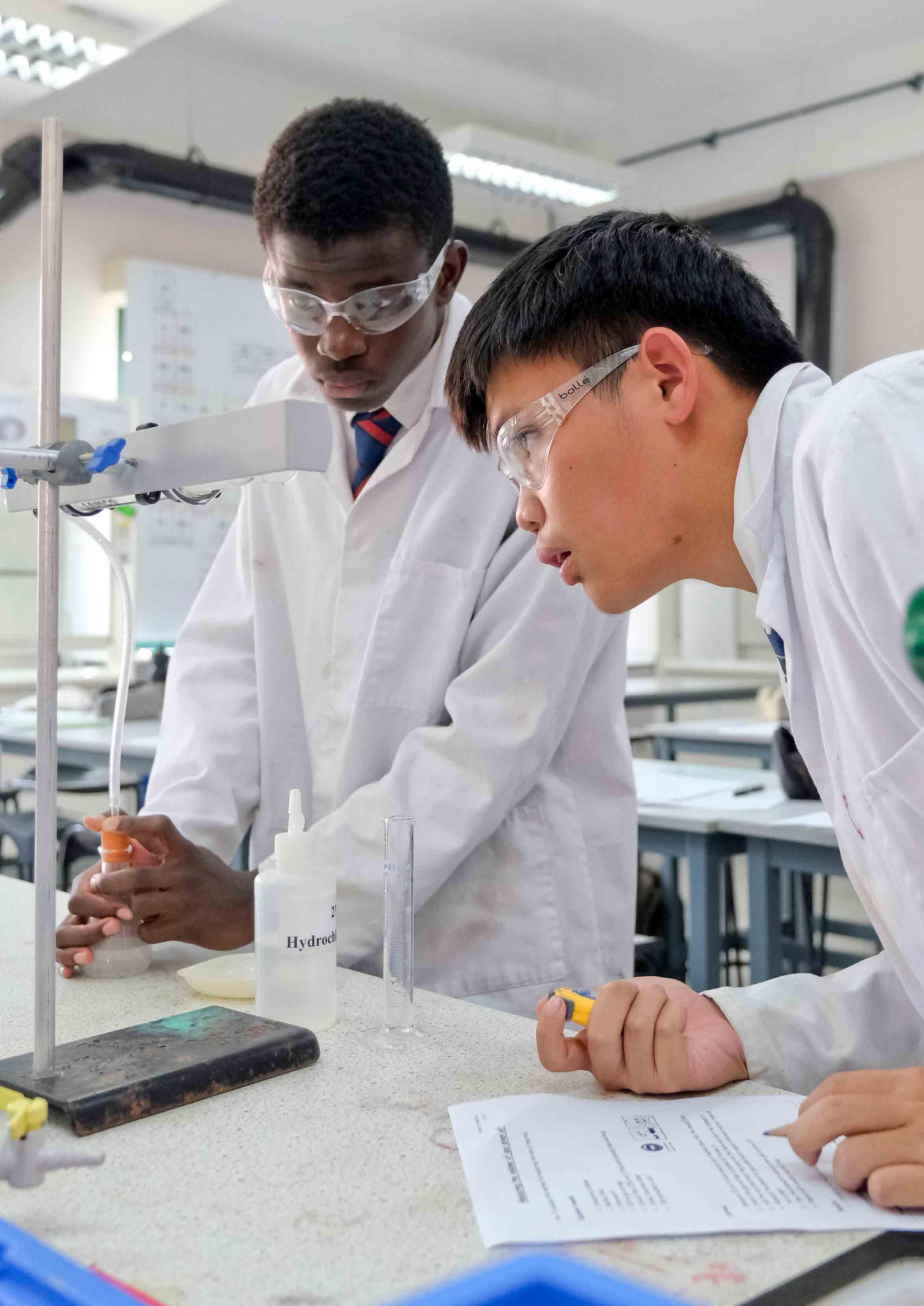

Jerudong International School is an academically selective school. Applicants not suited to the broad academic curriculum offered by the School are unlikely to be offered a place. Limited special needs support is available. Support is also given, where necessary, to pupils whose first language is not English. This may include the Intensive Language Programme.
The academic year in JIS follows the British School system which starts late August and ends early July. The long holiday is taken in July and August. Consequently, students are admitted according to a child’s age in the period 1 September - 31 August. The School operates a policy of placing children in the year level according to their age and it is only in exceptional circumstances that a child would be permitted to be accelerated or held back from their year level.
The first stage in enrolling your child is to visit the Admissions section of the School website: www.jerudonginternationalschool.com
To complete the application process for each child you need to fill out the online form on the school website. For the online application, you must have an electronic copy of:
• your child’s latest school report
• a passport sized photograph
• your child’s Bruneian identity card (IC) (if applicable)
• your child’s birth certificate showing parents names
• the information page of your child’s passport
• both parents’ passport information page
• both parents Bruneian identity card (IC) (if applicable).
• B$200 Application Fee
It is important that all relevant questions are answered on the application form, particularly about the extent of your son or daughter’s tuition in an English medium school and information about any special learning needs that your child has (with accompanying reports and assessments). Before you submit the online application, please carefully read the terms and conditions of enrolment at Jerudong International School.
There is a B$200 application fee to be paid when the application is submitted. A receipt will be issued for you to claim reimbursement of the application fee from your employer (if applicable). Overseas applicants can arrange a bank transfer or pay by credit card. Any questions? Email: admissions@jis.edu.bn
The Vice Principal (Head of Senior School) and senior members of the Academic team assess each Senior School application. Students are required to sit for Entrance Tests. If applying from overseas, it may be possible to liaise with your child’s current school to arrange for them to take the tests. As the I/GCSE programme is a 2 year programme, it is unusual and rare for JIS to accept students into Year 11 (the second year of the programme). Please contact the Admissions team for more information.
Bruneian students are also required to sit a Bahasa Melayu placement test. This is not part of the entrance assessment for JIS but is to assist us in placing a student in the correct Bahasa Melayu class if offered a place in JIS.
1. Your child will need to sit an online, multiple choice Cognitive Ability Test (CAT). The test is divided into three sections with a short break between each section. It takes about 2 hours in total (including breaks). This online test is not a curriculum test. It measures verbal, mathematical, non-verbal and spatial intelligence and is a series of short tests designed to assess four different areas:
• Verbal Reasoning Test – thinking with words
• Quantitative (or Numerical) Reasoning Test – thinking with numbers
• Non Verbal Reasoning Test – thinking with shapes
• Spatial Ability Test – thinking with shape and space
The reason for these tests is that we receive applications from children who have been educated in many different countries / curriculum across the world. This gives us a consistent way of comparing students from many different backgrounds.

2. In addition your child will need to take two online curriculum tests. Each test is about 1 hour.
• Progress Test in Maths (PTM)
• Progress Test in English (PTE)
3. Depending on the computer test and exam paper results, we may ask a specialist teacher to have a further assessment with your child. Students who attain stanine 1, 2, 3 or 4 in their CAT test are referred to the Head of Learning Support and/or the Head of English as an Additional Language for further assessment.
4. The results of the online tests and any further assessment, will then be shown to the Vice Principal / Head of Senior School, together with your child’s most recent school report. At this stage, the Head of Senior School will decide if your child will progress to the final stage.
5. The final stage of the process is to meet a senior member of the Senior School, usually the Head of Senior School, who will interview your child. Each interview takes approximately thirty minutes and gives your child an opportunity to talk about their interests, ask questions about the school and discover more about the structure of the school and its academic programme. A parent must accompany the student to the interview.
You will be notified by the Registrar either at the end of the interview process or a few days later regarding the enrolment of your child. The final decision is a collaboration between the Vice Principal (Head of Senior School), the Senior Registrar and where appropriate, the Head of Learning Support. Where a child does not meet the entry levels required or is borderline, referral to the Principal can also occur.
Successful applicants receive a formal letter of offer and an endorsed Student Pass* application (for non-Bruneian students). There is an acceptance form attached to the offer letter that needs to be signed and returned to the Admissions Office. Once this has been received and the school deposit paid, this formally completes the enrolment process.
The Admissions staff are happy to show you the site at any time during school hours (8 am–2 pm, Monday to Thursday). Boarding House tours are available before 2 pm most days. Each tour takes approximately one hour. Please phone at least 24 hours in advance to make an appointment.
Please visit our website for details of our Open Days. If you live outside Brunei, we are happy to arrange an online meeting.
The Brunei Government requires all foreign students to have a Student Pass in order to study in Brunei. The form has to be endorsed by the school and countersigned by the Principal. The form is available from JIS Admissions Office. The application process for Boarding House students whose family resides outside of Brunei is handled by an agent retained by the school. The agent charges a fee in addition to the cost of the Student Pass. Students may not commence their studies at the school without a valid Student Pass. The Student Pass is in addition to a Dependent Pass. For any questions, please email visa@jis.edu.bn
The information in this Booklet is correct as at 18 August 2025. The School reserves the right to make changes where deemed necessary.
